
| Centre Name: | 
Centre for Learning and Teaching (CLT) |
| Chairperson: | Dr. Wei Chooi Yi |
| Description of Centre: | The Centre for Learning and Teaching aims to cultivate and promote research and scholarship in the area of Learning and Teaching. Its objectives are:
|
| Research area: |
|
| NO. | NAME | FACULTY | MEMBER |
|---|---|---|---|
| 1 | Mr Yeoh Hong Beng | FSc | Full |
| 2 | Assistant Professor Dr Siew Pei Hwa | FCI | Full |
| 3 | Ms Er Pek Hoon, Winnie | FAM | Full |
| 4 | Assistant Professor Dr Gerard Sagaya Raj a/l A Rajoo | FAS | Full |
| 5 | Ms Geetha Veerappan | FAS | Full |
| 6 | Ir. Dr. K. Chandrasekaran | FEGT | Full |
| 7 | Assistant Professor Dr Cheah Phaik Kin | FAS | Full |
| 8 | Mr Lee Chee Heong | CFS, Kampar | Associate |
| 9 | Assistant Professor Dr Lee Jer Vui | LKC FES | Full |
| 10 | Ms Diong Fong Wei | FAS | Full |
| 11 | Ms Mariam Nainan a/p T.K Nainan | LKC FES | Full |
| 12 | Ms Beh Hooi Ching, Michelle | LKC FES | Full |
| 13 | Assistant Professor Dr Ida Puteri Bte Mahsan | FAS | Full |
| 14 | Puan Muliyati Binti Mat Alim | FAS | Full |
| 15 | Assistant Professor Dr Priscilla a/p Moses | FCI | Full |
| 16 | Pn Norlis binti Ismail | FAS | Full |
| 17 | Pn Nur Aizuri binti Md Azmin | FAS | Full |
| 18 | Ms Ong Sheau Wen | FAS | Full |
| 19 | Cik Siti Ummaizah Binti Meor Musa | FAS | Full |
| 20 | Ms Malvin Kaur a/p Kunden Singh | FAS | Full |
| 21 | Ms Bharathi a/p Mutty | FAS | Full |
| 22 | Mr Cheah Kok Sung | FAS | Full |
| 23 | Ms Lau Siew Yee | FBF | Associate |
| 24 | Ts Anbuselvan a/l Sangodiah | FICT | Full |
| 25 | Assistant Professor Dr Manoranjitham a/p Muniandy | FICT | Full |
| 26 | Ts Lim Ean Heng | FICT | Full |
| 27 | Ms Viji A/P Ramamuruthy | FAS | Full |
| 28 | Ms Surindar Kaur A/P Gurmukh Singh | FAS | Full |
| 29 | Ms Saraswathy A/P Thurairaj | FCI | Full |
| 30 | Ms Ooi Zao May | FAS | Full |
| 31 | Ms A.Avene a/p Atputharaj | FAS | Full |
| 32 | Assistant Professor Dr Tan Pei Meng | FAM | Full |
| 33 | Pn Nurullashkeen Binti Mohd Anis | FAS | Full |
| 34 | Assistant Professor Dr Ngeow Yoke Meng | FCI | Full |
| 35 | Assistant Professor Dr Chen Kah Pin | LKC FES | Full |
| 36 | Ms Kok Hui Meian, Jass | FAS | Full |
| 37 | Ms P Kangathevi a/p Ponnudorai | FAS | Full |
| 38 | Assistant Professor Dr Pradeep a/l Isawasan | FICT | Full |
| 39 | Mr Chin Ying Shin | FAS | Full |
| 40 | Mr D Karunanithy a/l Degeras | FSc | Full |
| 41 | Ms Kristina a/l Francis | FAS | Full |
| 42 | Assistant Professor Ts Dr Lim Seng Chee | FICT | Full |
| 43 | Ts Yong Tien Fui, Albert | FICT | Full |
| 44 | Assistant Professor Dr Sharon Jacqueline a/p Albert Wilson | FCI | Full |
| 45 | Assistant Professor Dr Renu Joseph | FAS | Full |
| 46 | Ms Ranjini a/p Kunalan | FAS | Full |
| 47 | Assistant Professor Ts Dr Lim Seng Poh | FICT | Full |
| 48 | Assistant Professor Ts Dr. Wong Pei Voon | FICT | Full |
| 49 | Mr Hoon Hui | FBF | Associate |
| 50 | Ms Liew Feng Mei | FBF | Full |
| 51 | Mr Ranjeet Singh a/l Bishan Singh | FSc | Full |
| 52 | Mr Khairul Rizuan bin Suliman | FSc | Full |
| 53 | Assistant Professor Dr Charanjit Kaur a/p Darshan Singh | FCI | Associate |
| 54 | Assistant Professor Dr Badariah binti Sani | FAS | Full |
| 55 | Assistant Professor Dr Indrani a/p Rama Chandran | FAS | Full |
| 56 | Mr. Prashanth Beleya | FSc | Full |
| 57 | Pn. Juliana binti Abu Bakar | FBF | Associate |
| 58 | Ms. Thavamalar a/p Ganapathy | FBF | Associate |
| 59 | Ms. Chitrah a/p Krishnan | FBF | Associate |
| 60 | Ms Nur Asyrani binti Che Ismail | FAS | Full |
| 61 | Mr. Mohd Amir Izuddin bin Mohamad Ghazali | FAS | Full |
| 62 | Ms Tan Lee Siew | CFS, Kampar | Associate |
| 63 | Ms Ooi Siew Fong | CFS, Kampar | Associate |
| 64 | Mr. Fernando Paulo Da Costa Andrade | LKC FES | Full |
| 65 | Assistant Professor Dr. Noor Azmira binti Mohamed | FAS | Full |
| 66 | Pn. Emma Marini binti Abd Rahim | FCI | Full |
| 67 | Mr. Mohan a/l Selvaraju | FSc | Full |
| 68 | Ms. Nuramira binti Anuar | FAS | Full |
| No. | Date | Event |
|---|---|---|
| 1 | 8 - 11 January 2019 | Bhutan Exposure Tour to UTAR on Comprehensive Sexuality Education (CSE), Held on 8 - 11 January 2019, Venue: UTAR Sg Long, Selangor & Kampar Campus Perak, Malaysia. Link: https://news.utar.edu.my/news/2019/Jan/18/1/1.html |
| 2 | 22-Jan-19 | CLT Talk on "Coping with illness in the digital era: the role of online peer support communities" - conducted by Prof Neil Coulson, University of Nottingham, United Kingdom School of Medicine. Venue: KAG001, UTAR Sungai Long Campus on 22 January 2019 Link: https://news.utar.edu.my/news/2019/Jan/31/1/1.html |
| 3 | 12-Feb | CLT Talk on "The Constitution of a Company" - conducted by Associate Professor Dr. Chan Wai Meng, Department of Business Strategy and Policy, Faculty of Business and Accountancy, University Malaya - held on 12 Feb 2019, 10am-12 noon. Venue: KA512, Block KA, UTAR Sungai Long, Selangor, Malaysia. 2019 |
| 4 | 21-Feb-19 | CLT Talk on "Auditors' Duties and Liabilities - Issues and Implications for Accounting Education and Research" - conducted by Dr Loganathan Krishnan, Department of Business law & Taxation, School of Business, Monash University Malaysia - held on 21 Feb 2019, 10am-12 noon. Venue: KA506, Block KA, UTAR Sungai Long, Selangor, Malaysia. |
| 5 | 27-Feb-19 | Collaboration Meeting with Dong Zong delegates at DongZong Building, Kajang, Selangor to explore the research collaboration into: 1. SWOT Analysis of Chinese Independent High School in Malaysia 2. Exploring the current teaching and learning facilities in Malaysian Chinese Independent High School 3. Misconception on the syllabus between government schools and Chinese Independent High School in Malaysia. 4. Students' academic achievement and market demands 5. Teacher quality and student academic performance 6. Challenges faced by the stakeholders involved with Chinese Independent High School 7. Teaching and learning for educational sustainability development among Chinese Independent High School in Malaysia 8. Development of Chinese Independent High School in Malaysia: Past, Current and Future 9. Adoption of technology into the teaching and learning |
| 6 | 15-Mar-19 | CLT Talk on "Cross Border Teaching and Learning on Virtual Platform" by Faculty of Creative Industries (FCI) academic Dr Sharon Jacqueline on 15 March 2019 at UTAR Kampar Campus. Link: https://news.utar.edu.my/news/2019/March/25/1/1.html |
| 7 | 28-Mar-19 | Centre for Learning and Teaching (CLT) received four delegates from Dezhou University at Kampar Campus on 28 March 2019 Link: https://news.utar.edu.my/news/2019/April/25/2/2.html |
| 8 | 29-Jun-19 | Participation in the UTAR Cross-disciplinary R&D Colloquium 1.0 - Organised by the Institute of Postgraduate and Research - on 29 June 2019. Venue: LDK 1, 2 and 3, Block L, UTAR Kampar, Perak, Malaysia. Link: https://news.utar.edu.my/news/2019/July/3/3/3.html |
| 9 | 12-Jul-19 - 3 Aug 2019 | Provide training and educational study to the Guangxi University delegates - held on 12 July - 3 Aug 2019, Venue: UTAR Sungai Long and UTAR Kampar Link: https://news.utar.edu.my/news/2019/Aug/26/2/2.html |
| 10 | 24-Aug-19 | The Symposium on Science Education 2019 - jointly organized by the Institute of Postgraduate Studies and Research, Centre for Learning and Teaching and Division of Programmes Promotion - held on 24 August, 2019.Venue: KB104, Block KB, UTAR Sungai Long, Selangor, Malaysia. Link: https://news.utar.edu.my/news/2019/Aug/30/2/2.html |
| 11 | 18-Oct-19 | CLT Research Forum on 18 Oct 2019. Venue: A011, Block A, UTAR Kampar Link: https://news.utar.edu.my/news/2019/Oct/30/01/01.html |
| 12 | 23-Nov-19 | Participation in the UTAR Cross-disciplinary R&D Colloquium 2.0 - Organised by the Institute of Postgraduate and Research - on 23 Nov 2019. Venue: Level 2, KB Block, UTAR Sungai Long, Malaysia. Link: https://news.utar.edu.my/news/2019/Dec/02/03/03.html |
| No. | Date | |
|---|---|---|
| 1 | Bhutan Exposure Tour to UTAR on Comprehensive Sexuality Education (CSE), Held on 8 - 11 January 2019, Venue: UTAR Sg Long, Selangor & Kampar Campus Perak, Malaysia.
UTAR’s Centre for Learning and Teaching (CLT) hosted a delegation of six officers from Bhutan’s Royal Education Council (REC) and Ministry of Education (MOE) for a four-day exposure tour from 8 to 11 January 2019. They were Bhutan’s MOE Department of School Education (DSE) Director General Karma Tshering, DSE School Health and Nutrition Division (SHND) Deputy Chief Programme Officer Karma Dechen, Department of Youth and Sports (DYS) Youth Centre Division (YCD) Chief Programme Officer Rinzin Wangmo, DYS YCD Assistant Programme Officer Tandin, REC Unit Head and Curriculum Developer (Social Studies and Early Childhood Care and Development) Dorji Tshewang, and REC Curriculum Developer (Biology) Karma Dorji. The four-day exposure tour is a programme allowing the delegates to learn about Malaysia’s experience in implementing the comprehensive sexualities education (CSE) curriculum. In doing so, the exposure tour also connected the delegates to local educators and youth leaders via various engagement activities such as interactive learning, discussion, sharing and reflective practices with regard to youth life skills and wellbeing. The programme also served as a platform where the delegates experienced Malaysia’s cultural diversity via youth centre visits, social interaction and youth camp observation. Receiving the delegation at Sungai Long Campus was UTAR Vice President for Internationalisation and Academic Development Prof Ir Dr Ewe Hong Tat. Also present were UTAR CLT Chairperson Dr Wei Chooi Yi, Programme Coordinator for Science and Technology Programmes Ts Dr Chen Kah Pin, Programme Coordinator for Non-Science and Technology Programmes Dr Ngeow Yeok Meng, Faculty of Accountancy and Management senior lecturer Er Pek Hoon, and Centre for Foundation Studies (CFS) (Sungai Long Campus) assistant lecturer Lee Cin Dee. Introducing UTAR as a 17-year-old comprehensive not-for-profit private university on its trajectory to be global with transformative societal impact, Prof Ewe also mentioned UTAR’s diverse academic and non-academic programmes, R&D initiatives as well as the UTAR Soft Skills Development Certificate (USSDC), all of which are essential in grooming students to be well-rounded in the advent of the Fourth Industrial Revolution. “With over 300 collaborative partners comprising local and international universities and industry players which have brought about various mutually beneficial exchanges, we are certainly looking forward to the potential collaborations with universities in Bhutan such as students exchange programmes,” added Prof Ewe. “We’re here to learn about the experience of the Malaysian society in dealing with issues related to health, sex education, and life challenges, particularly among the young generations," explained Karma Tshering, drawing his concern on coping with the fast pace of young people’s life in the Himalayan kingdom with more than 500 schools and three universities. On behalf of the delegation, he also expressed the delight and honour to be visiting UTAR which is one of Malaysia’s leading universities and also picking the brains of some of the very outstanding academics for ideas. The first day at UTAR saw a sharing session by Faculty of Creative Industries (FCI) lecturers, namely Lim Wai Ping Penny, Foo Mei Li and Beh Chun Chee on their ongoing effort to create awareness for endometriosis through their non-for-profit organisation called MyEndosis. The campaign strategies and plan of the five years old movement were shared to give some insights on the alternatives that can be applied in putting a taboo topic, such as menstruation, under the spotlight. To further allow the delegates to have an overview of university students’ perceptions on reproductive health and awareness, an interactive session with the Second Year Medical students of the Faculty of Medicine and Health Sciences (FMHS) was held. This was then followed by another session which saw the delegates interacting with UTAR students to exchange thoughts and issues commonly faced by Malaysian youths. The delegates also made a trip up north on the following day where they were given a tour around the award-winning Kampar Campus by Faculty of Business and Finance (FBF) academics Lau Siew Yee and Lau Wai Kwan. Through a lecture session by Faculty of Arts and Social Science (FAS) Psychology and Counselling lecturer Tan Soon Aun, all delegates also further deepened their understanding on Malaysia’s approach in implementing sexuality and reproductive health education in schools. A researcher in the studies of adolescents’ development, sexuality, cultural values and so on, Tan also highlighted some of the challenges faced in the implementation of such topics in the Malaysian school syllabi. According to Tan, as CSE prepares students to be responsible for the consequences of becoming sexually active, therefore the curriculum should be medically accurate and age appropriate even if it has been customised according to one’s own cultural norms and sensitivities. Head of Department of Soft Skills Competency (DSSC) for Kampar Campus Hee Chwen Yee also gave a succinct presentation of the USSDC certification system as well as DSSC’s diverse community engagement programmes. While in Kampar, the delegates also took the opportunity to visit Westlake International School (WIS) where they were received by WIS Executive Director Hew Fen Yee, Finance Director Hew Fee Voon, Principal Sherry Ann Daniel, Academic Director Anushia Senthe, and Student Services and Administration Director Sara Wong. The discussion with the school’s management team gave the delegates a glimpse of how an international school which places emphasis on educational excellence and holistic character development is managed. The delegates were equally impressed by WIS’s affordable fee structure which also ensures quality education. With Malaysia being widely known as Asia’s cultural melting pot, the delegates were also keen to learn about how topics such as healthy relationships among peers are being talked about by both religious and non-religious groups as well as youth engagement activities. The places they visited throughout the third day included the International Youth Centre (IYC) in Kuala Lumpur, Buddhist Maha Vihara Malaysia, the National Population and Family Development Board (LPPKN) under the Ministry of Women, Family and Community Development, and the Young Men’s Christian Association (YMCA). Received by IYC Director Dr Mohamed Maliki bin Mohamed Rapiee, all six delegates learnt about IYC’s various CSE-relevant programmes, activities and awareness campaign on promoting life skills for youths including the ability to build lifelong relationships. A similar topic of discussion was also extended to Buddhist Maha Vihara (BMV) Malaysia but in the context of Theravada Buddhism, one of the major Buddhist traditions found mainly in Sri Lanka and Southeast Asian countries. Through the dialogue sessions with the monks, curriculum developers and advisors of BMV, the delegates were also introduced to BMV’s roadmap as a local Theravada Buddhist organisation in promoting the overall well-being of Malaysian youths. While at LPPKN, the delegates also learnt about the government’s initiatives in encouraging children and youths to build healthy relationships among peers. Topics such as family planning, contraception, prevention of teenage pregnancy and others were also discussed between the delegates and LPPKN. The delegates also learnt of the many plans in the Board’s pipeline to raise awareness on various teenage social issues. The last stop of the delegates’ fact-finding expedition for the day, YMCA also shared information on its role in promoting sustainable and healthy relationship among teenagers in line with Christian values. On top of that, the delegates also learnt of the Association’s various recreational and sports activities, sign language courses, Boys’ Brigade and Christian Fellowship activities which are essential in shaping the youths’ positive outlook in life. To reinforce the delegates’ medical knowledge in topics such as sex education, contraceptive and kindred, a presentation session by FMHS Department of Population Medicine’s Dr Foo Chai Nien titled “Public Health Issues, Teenage Pregnancy, Awareness Campaign and Counseling Available for Students and Abused Women and Children” was also held on the last day. A brainstorming session was also held on the last day to encapsulate the knowledge gained throughout the exposure tour. According to Karma Tshering, their ultimate aim is to integrate skills and values into the conventional knowledge-based teaching in classrooms. “Values should come first and the rest such as skills and knowledge will follow suit. The importance of skills and knowledge do not supersede the importance of values because the quality of the first two is dependent on the last one,” he mentioned. Karma Dechen concurred and added that the Ministry does not wish to see the youths not being able to put into practice the knowledge and skills learnt. “As we are reforming the syllabus in order to include life skills, we are also taking this opportunity to integrate sex education as well. Such reforms will see the inclusion of topics such as bullying, sexual harassment, domestic abuse and so on into the our syllabus,” she revealed, adding that the Queen of Bhutan is also playing an active role to raise awareness on the importance of sex education by visiting villages and rural areas. To Karma Dorji who is a curriculum developer, one of the most useful lessons learnt from the exposure tour was the way to manage issues related to youth, puberty and reproductive health. Also a curriculum developer and specialist, Dorji Tshewang felt that the topics delivered by the academics were very informative which can also be a very handy guide to develop related curriculum. “The very first presentation on endometriosis is something new to us,” Tandin told. “The problems faced by the young people in Bhutan are quite similar to those faced by young Malaysians. Therefore, we feel we can always observe some of the programmes or activities carried out here and replicate them in our country to address the issues,” the programme officer continued. “Bhutan has a very young population. For example, 21 per cent of our population are aged between 13 to 24 years old. As the country is currently at the crossroad of modernisation, we are faced with the onslaught of new developments such as social media boom, growth of consumerism and so on,” said Rinzin Wangmo, further stressing the relevance of CSE education in Bhutan. The delegates also extended their utmost appreciation to UTAR for the warm hospitality and also the academics for sharing their expertise. Describing UTAR as a big learning centre, Karma Dechen looks forward to carrying exchange programmes with the University in the near future. “We would like to express our gratitude to all those involved in making this exposure tour very educative and interesting,” she said. On their final thoughts about UTAR and Malaysia, Rinzin Wangmo remarked, “UTAR is a big university with a diverse range of subjects to programmes available. I feel it is therefore befitting for a diverse country like Malaysia. The lecturers whom we interacted with are all humble, knowledgeable and smart. Malaysia is a wonderful country where it is not overly crowded, clean, efficient, and the people are warm. Good luck to UTAR and Malaysia.” “Malaysia is a beautiful place to live in and UTAR is a place where every young people can make their dreams come true,” Tandin concluded. In line with the University’s commitment to enhance international standing and community outreach through global and community networking, exposure tours and training programmes as such are regular fixtures at UTAR. To date, the University through its research centres, training centre, as well as institutes have hosted local and international delegates for customised professional development programmes. Such programmes include English Teaching Skills Training Programme by the Centre for Extension Education, Chinese Language Teacher Training Programme by the Institute of Chinese Studies, Principles, Practice, Challenges and Human Capital of Islamic Financial Market by the Institute of Management and Leadership Training, and many more. |
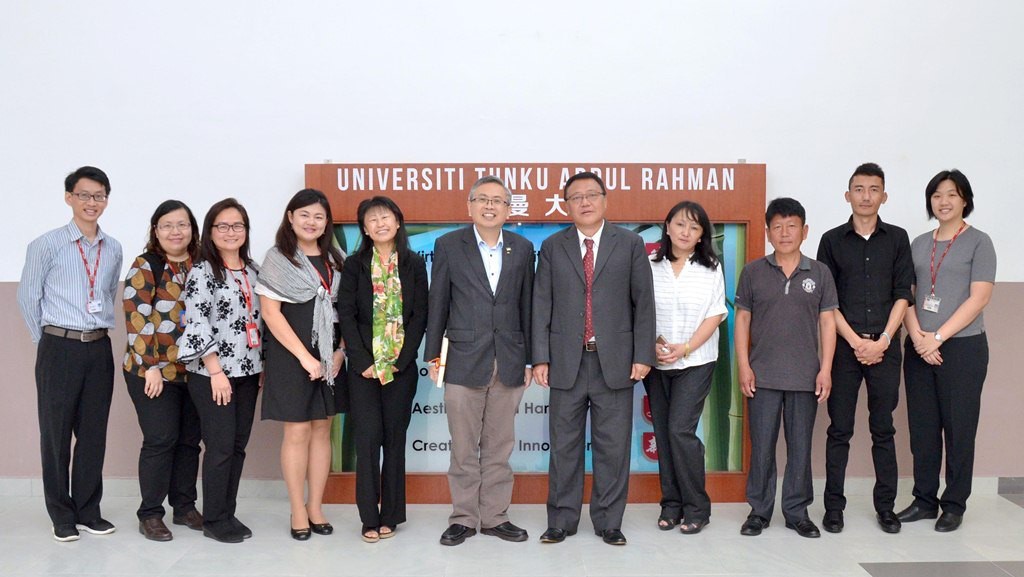
From left: Dr Chen, Er, Dr Ngeow, Dr Wei, Karma Dechen, Prof Ewe, Karma Tshering, Rinzin Wangmo, Dorji Tshewang, Tandin, and Lee 
Left pic: Prof Ewe extending his warm welcome to the delegates 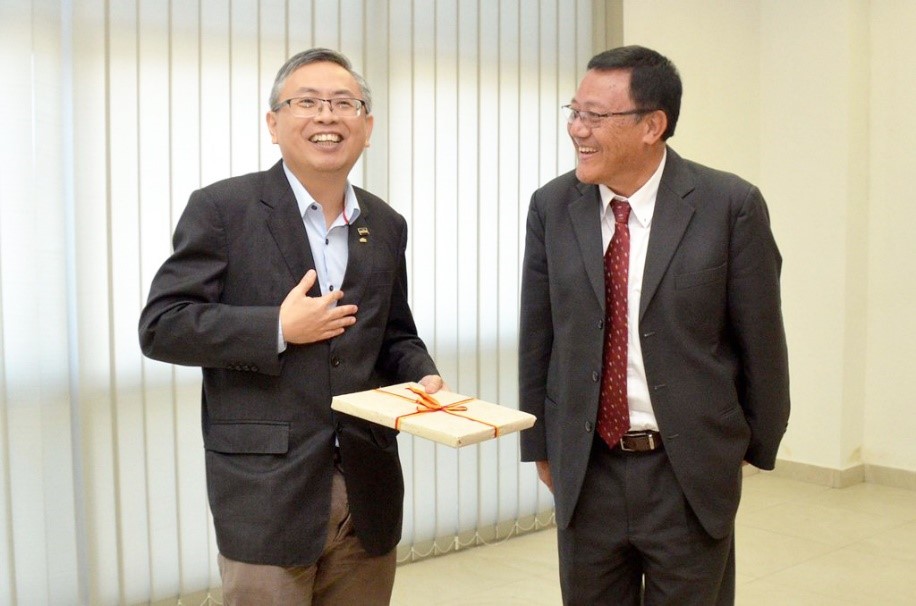
Prof Ewe and Karma Tshering sharing a light moment 
Foo presenting her lecture on taboos and superstitious beliefs in the Malaysian society 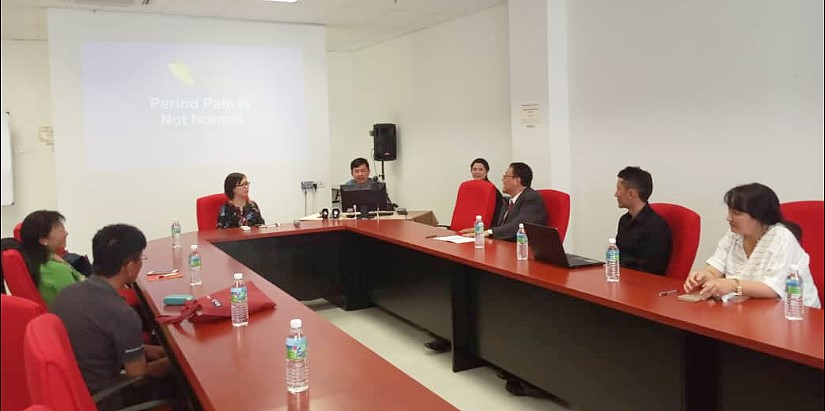
The delegates posing questions to Lim after her presentationt 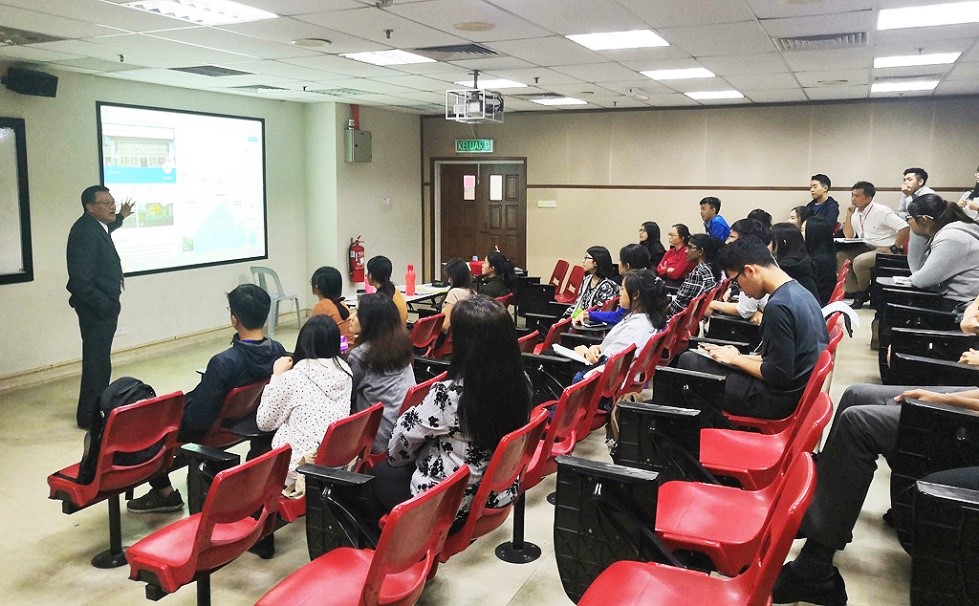
Karma Tshering giving a brief introduction on Bhutan and how the country measures success using the Gross National Happiness (GNH) 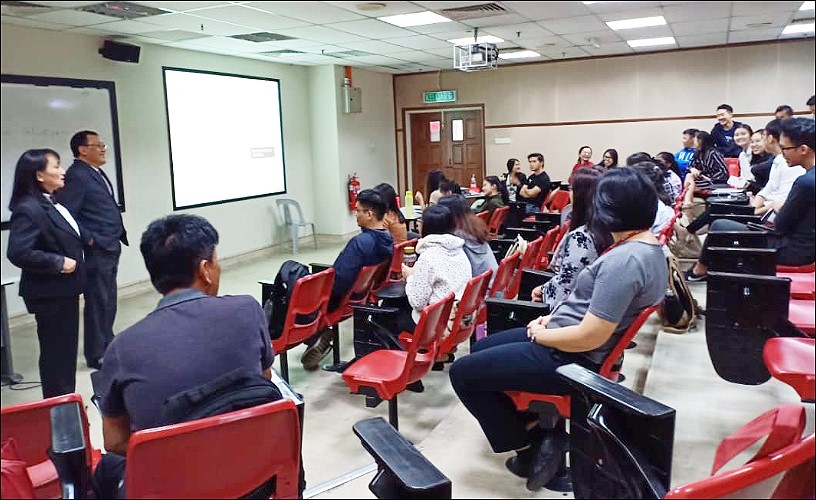
Karma Tshering and Rinzin Wangmo interacting with the FMHS’s second year Medical students to learn about their perception on health awareness 
Group photo of the UTAR 24 Festive Season Drum student performers with the delegates at Dewan Tun Dr Ling Liong Sik 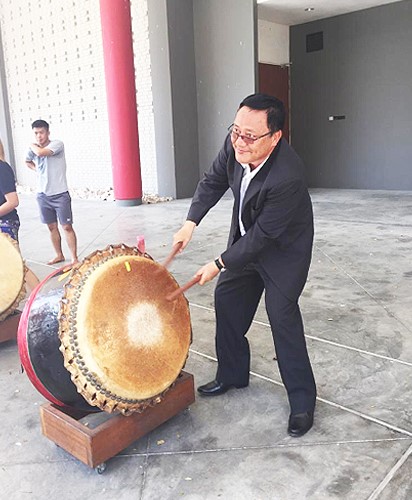
Karma Tshering trying his hands on the 24 Festive Season Drumt 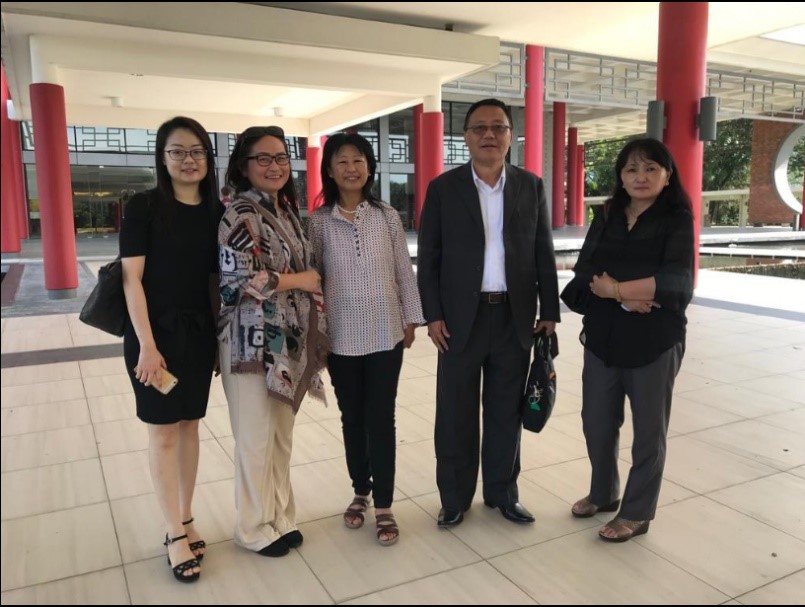
From left: Wai Kwan, Dr Ngeow, Karma Dechen, Karma Tshering, and Rinzin Wangmo 
From left: Tandin, Dr Wei, Karma Tshering, Rinzin Wangmo, Karma Dechen, Dr Ngeow, and Dorji Tshewang inside Dewan Tun Dr Ling Liong Sik 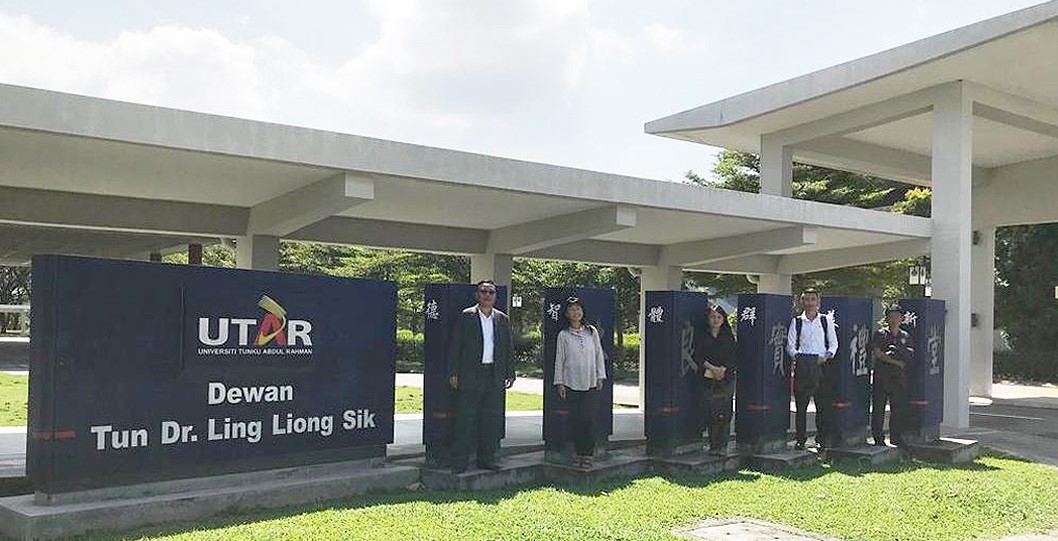
The delegates admiring the architecture of Dewan Tun Dr Ling Liong Sik 
From left: Siew Yee, Dorji Tshewang, Tandin, Rinzin Wangmo, Karma Tshering, Dr Wei, Karma Dechen, and Dr Ngeow taking a photo with the iconic Confucius-Einstein bronze sculptures at Kampar Campus 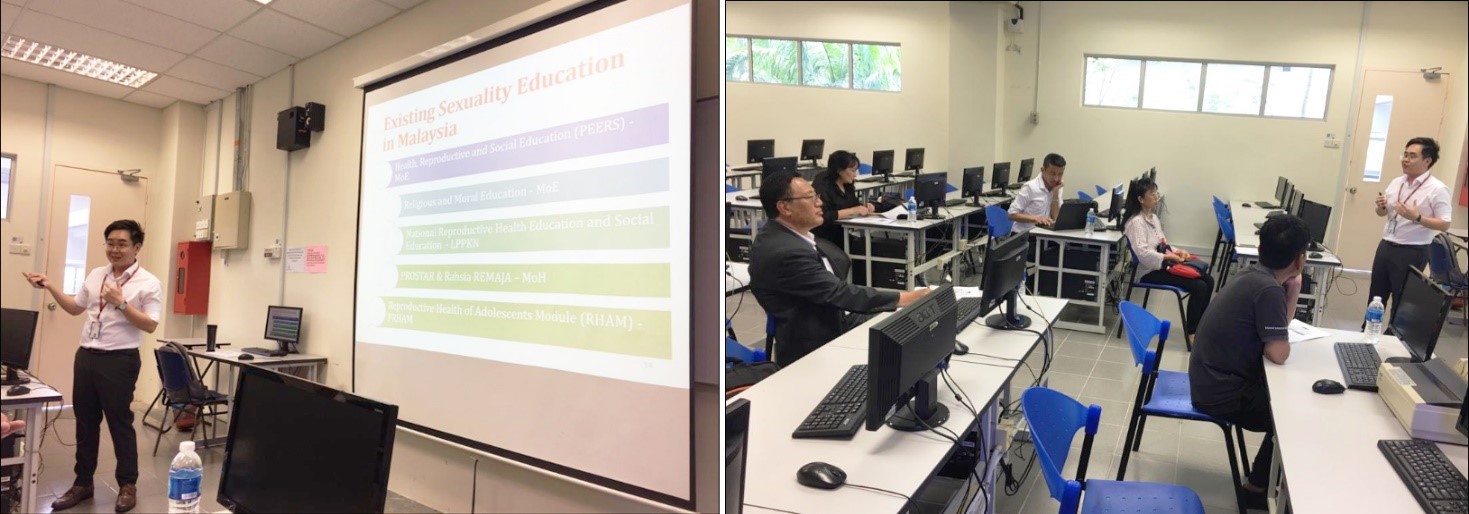
Tan sharing with the delegates his research findings 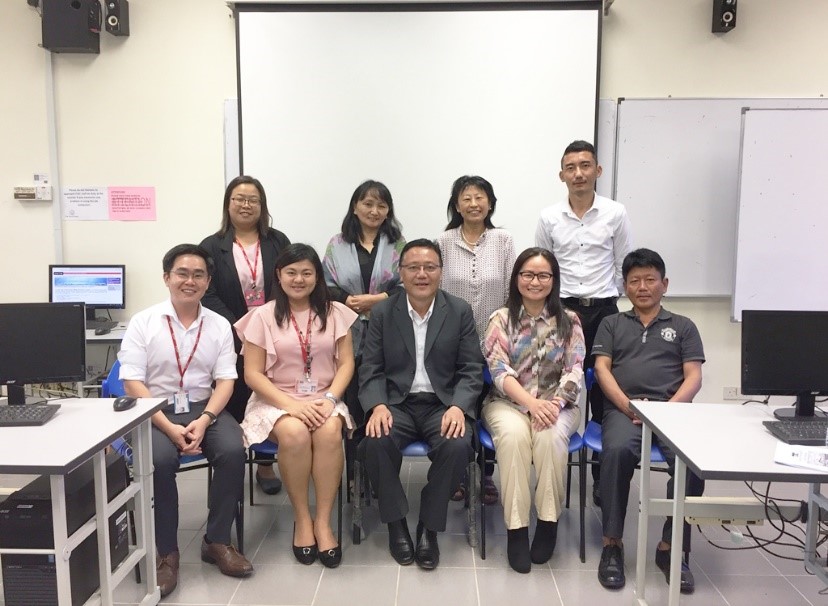
Clockwise from top left: Hee, Rinzin Wangmo, Karma Dechen, Tandin, Dorji Tshewang, Dr Ngeow, Karma Tshering, Dr Wei, and Tan 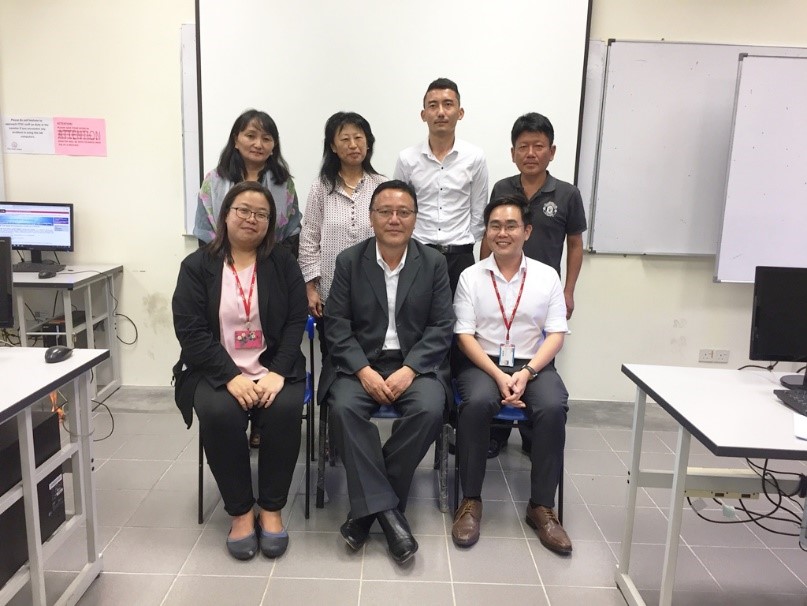
Group photo of the delegates with WIS Executive Director Hew (seated, third from left), the WIS management team and students 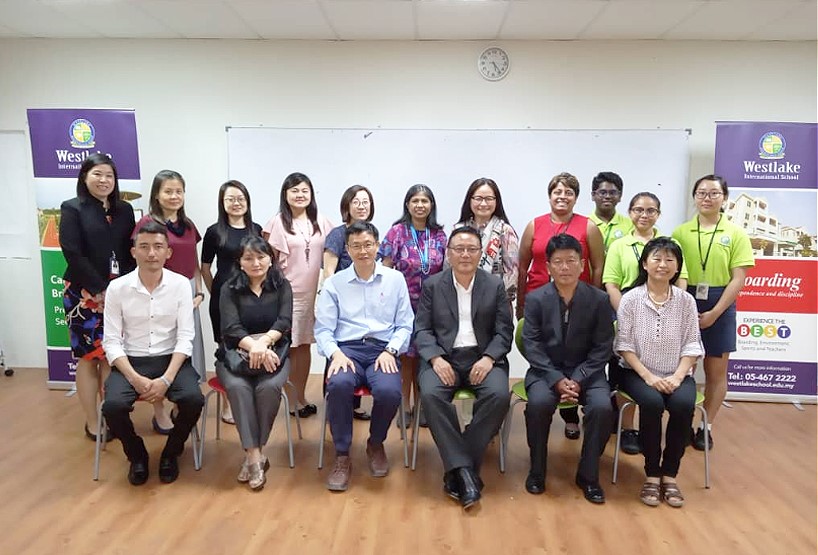
From left: Tandin, Karma Dorji, Dorji Tshewang, Rinzin Wangmo, Karma Tshering, Karma Dechen, Dr Ngeow, and Dr Chen at IYC 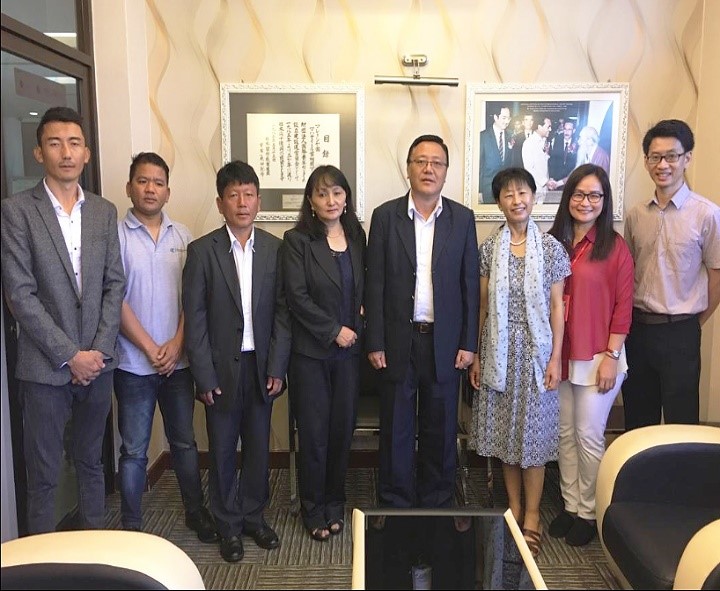
A discussion was held between the delegates and IYC 
Group photo of the delegates with Dr Maliki (seventh from left) and other IYC staff 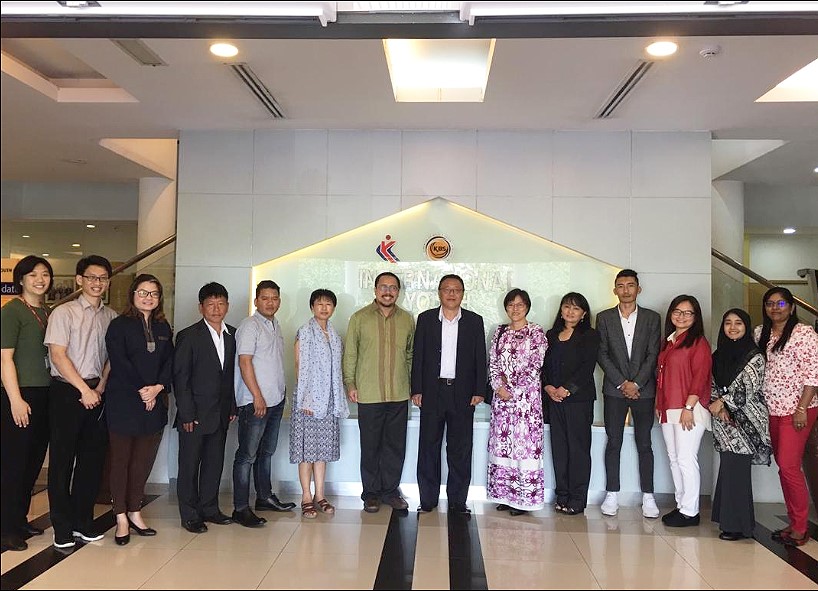
The delegates visiting BMV and were received by the Principal of Buddhist Institute Sunday Dhamma School Venerable K Siridhamma Thera (middle) and some BMV committee members 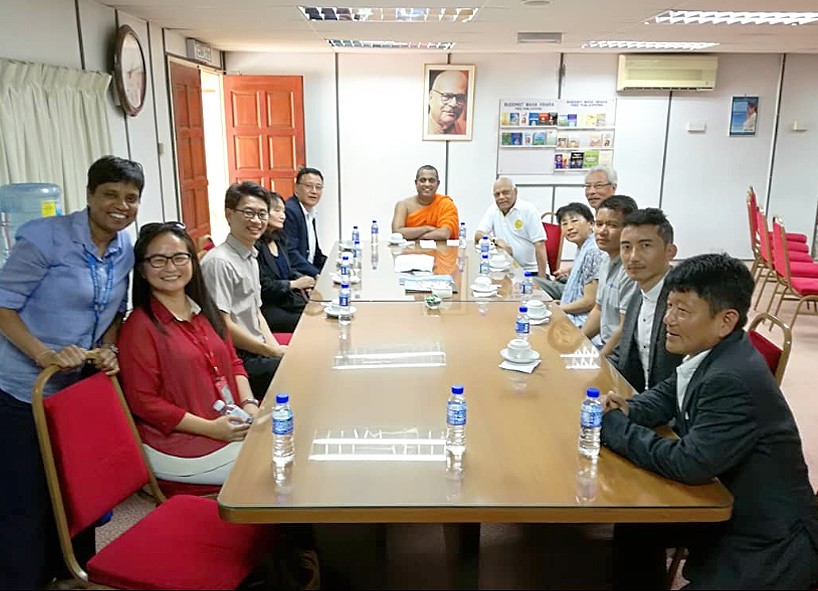
Group photo of the delegates with Venerable K Siridhamma Thera (seated, third from left) and BMV committee members 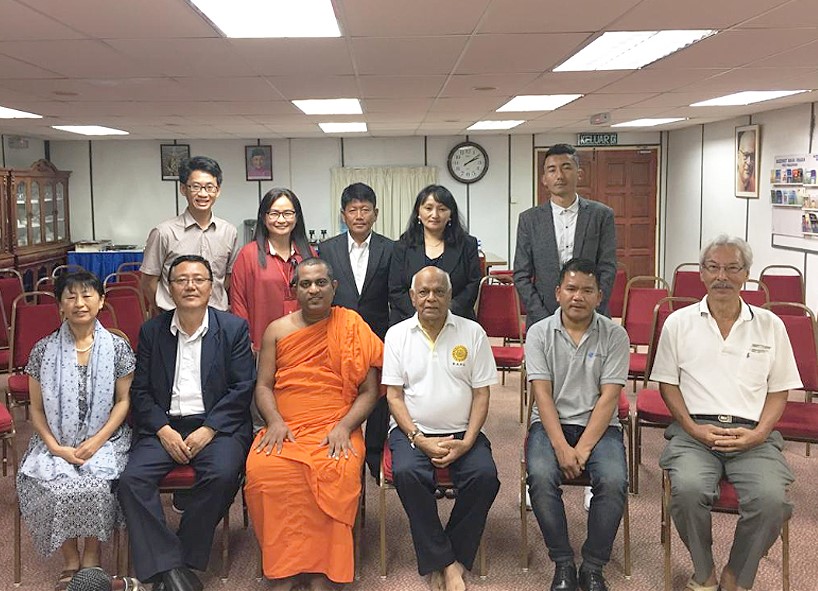
The delegates visiting BMV and were received by the Principal of Buddhist Institute Sunday Dhamma School Venerable K Siridhamma Thera (middle) and some BMV committee members 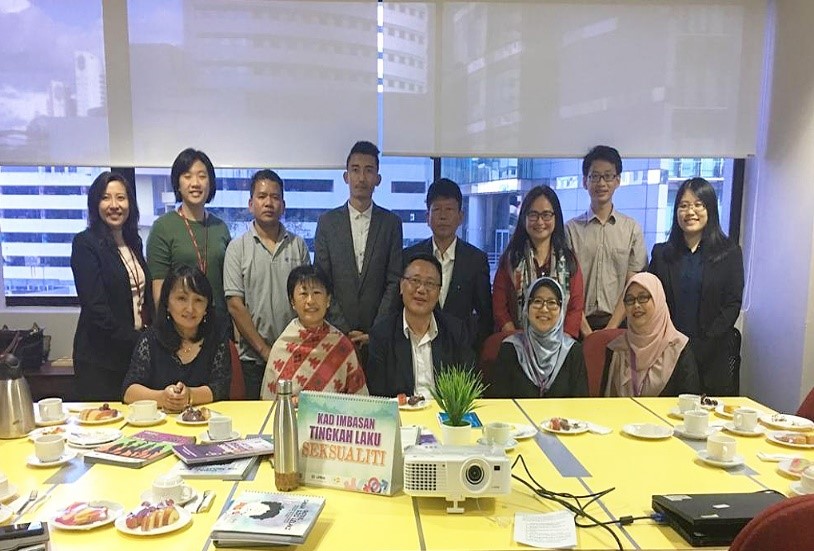
The delegates paying a visit to LPPKN 
Group photo of the delegates with LPPKN Head of Corporate Communication Unit Rosmonaliza binti Abdul Ghani (seated, fourth from right), LPPKN members and some secondary school students 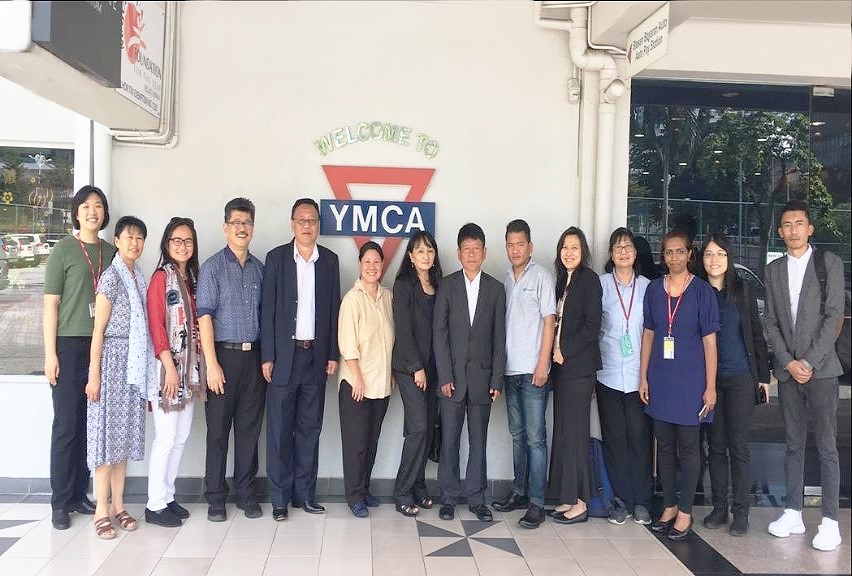
Group photo of the delegates with the YMCA committee members 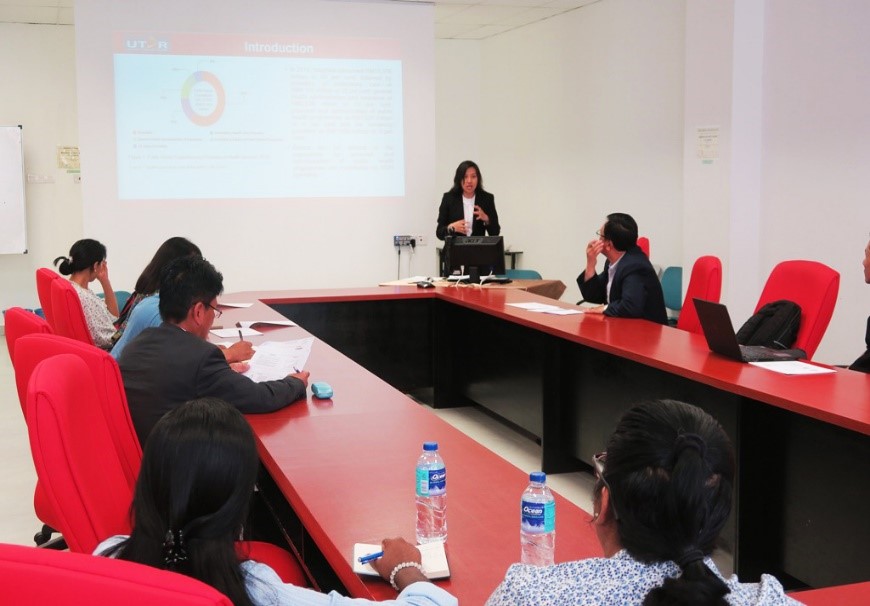
Dr Foo speaking on the topics from the perspective of a medical practitioner 
Clockwise from top left: Karma Dorji, Tandin, Dr Foo, FMHS Department of Chinese Medicine’s Dr Ng Foo Leng, Dr Teh Siew Hoon, FCI Department of General Studies’ Brahmmakumari a/p Balaraman, Dorji Tshewang, Geraldine a/p Pangiras, Rinzin Wangmo, Dr Ngeow, Karma Tshering, and Karma Dechen 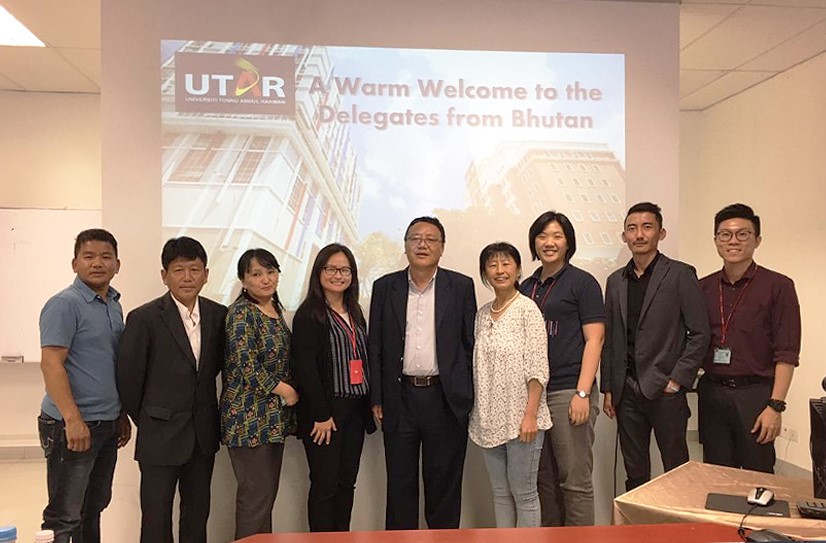
From left: Karma Dorji, Dorji Tshewang, Rinzin Wangmo, Dr Ngeow, Karma Tshering, Karma Dechen, Lee, Tandin and CFS (Sungai Long Campus) Head of Arts and Social Science Department Choon Min Wai after the brainstorming session |
| 2 | CLT Talk on “Coping with illness in the digital era: the role of online peer support communities” - conducted by Prof Neil Coulson, University of Nottingham, United Kingdom School of Medicine. Venue: KAG001, UTAR Sungai Long Campus on 22 January 2019
The UTAR Centre for Learning and Teaching (CLT) and Tun Tan Cheng Lock Centre for Social and Policy Studies (TCLC) organised a talk and workshop at UTAR Sungai Long Campus on 22-23 January 2019. It was conducted by University of Nottingham, United Kingdom School of Medicine Prof Neil Coulson. Prof Neil presented his talk titled “Coping with illness in the digital era: the role of online peer support communities”. Present at the talk were CLT Chairperson Dr Wei Chooi Yi, Faculty of Creative Industries (FCI) Programme Coordinator for Curriculum Development (Non-Science and Technology Programmes) Dr Ngeow Yeok Meng, FCI Dr Sharon Wilson, lecturers, students and public. The talk focused on the role of online peer support communities through examples from his programme of research spanning over 15 years. He also critically discussed a range of issues which include the reasons for engaging with online peer support communities, its benefits as well as the risks, the psychosocial impact of participation and how support is enacted online. Aside from that, the talk reflects on the key methods used to investigate the role of online peer support communities as well as provide recommendations for future research. In his talk, he spoke about online support communities, the popularity of online support communities, potential advantages of online support communities, why and what people use in online support communities, theoretical perspectives, empowerment, Affordance Theory and future directions. He said, “The online support communities are often been described as virtual communities, web-based communities, online support groups and e-communities supported by several platforms such as discussion forums, messaging applications, chat rooms, social networking sites, blogs, micro-blogs and virtual reality environments. The two main types are known as synchronous or asynchronous.” He added, “The most common types of online support communities are dedicated to supporting those affected by health conditions. Other types include behaviour change, parenting, caregiving and bereavement. In the past two decades, there has been an increase in the number of online support communities and the number of people accessing communities.” The interactive workshop on the second day saw a detailed explanation of online research methods and tools which can be used when embarking on research. The workshop aimed to provide participants with both a theoretical and practical understanding of their use in research as well as to consider the ethical issues which may arise and how to mitigate against potential risks. The topics covered by Prof Neil were the use of online research methods, advantages and disadvantages of online research methods, online interviews, online focus groups, online surveys, social media as a research environment, ethical issues in online research and future directions. The workshop attracted participants from UTAR Sungai Long Campus and Kampar Campus as well as from Universiti Malaya (UM), Universiti Putra Malaysia (UPM), Taylor’s University and Al-Madinah International University. Participants benefited from this workshop as many were in the midst of their postgraduate studies or were contemplating embarking on online research. The workshop served as a platform for the participants to check their research methods with Prof Neil and to discuss ethics and other pertinent issues relating to the different online platforms. Prof Neil is an international expert in the role of online communities and healthcare. His work has demonstrated the important role online communities play in empowering patients as they attempt to cope with the challenges of long-term conditions. He explored the mechanisms through which patients may benefit from participation in online communities and factors that may be associated with the level of satisfaction as well as a range of psychosocial outcomes. Prof Neil has also published pioneering papers which have explored the provision of social support between community members. |
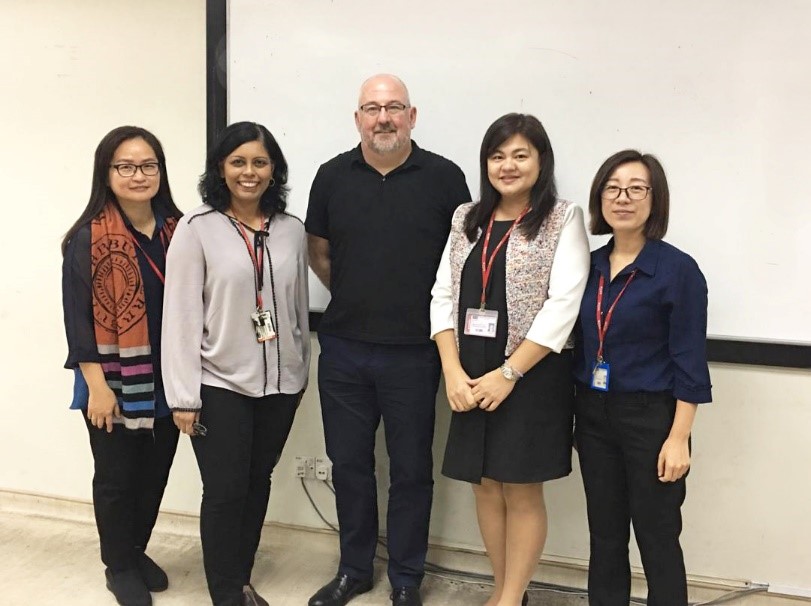
Prof Neil (middle) with CLT committees (from left) Dr Ngeow, Dr Sharon, Dr Wei and Faculty of Business and Finance lecturer Lau Siew Yee 
During Q&A session 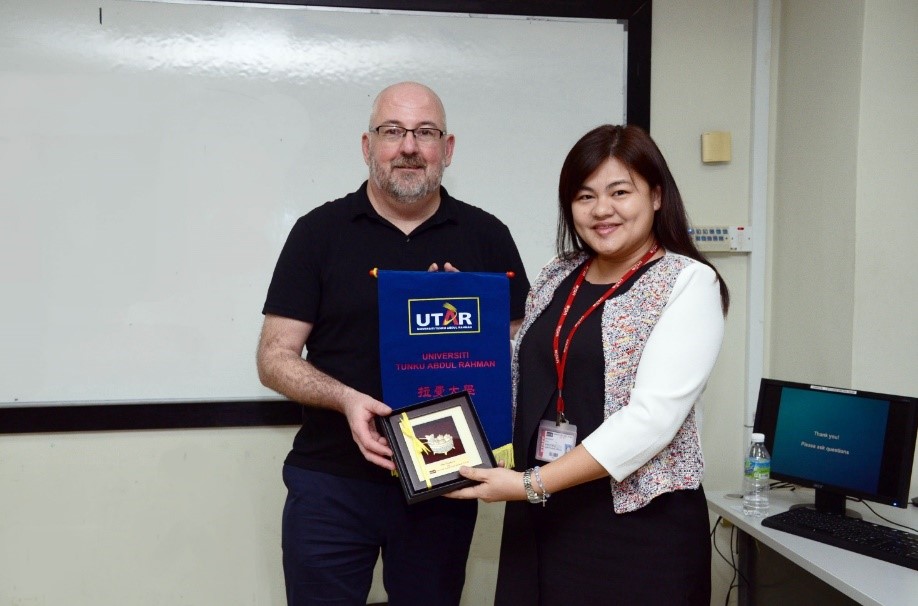
Dr Wei (right) presenting the token of appreciation to Prof Neil |
| 3 | 2) CLT Talk on “Cross Border Teaching and Learning on Virtual Platform” by Faculty of Creative Industries (FCI) academic Dr Sharon Jacqueline on 15 March 2019 at UTAR Kampar Campus.
The talk titled “Cross Border Teaching and Learning on Virtual Platform” by Faculty of Creative Industries (FCI) academic Dr Sharon Jacqueline was organised by Centre for Learning and Teaching (CLT) on 15 March 2019 at UTAR Kampar Campus. Present at the talk were CLT Chairperson Dr Wei Chooi Yi, students and staff. The talk aimed to enlighten participants on the use of virtual platforms, such as Facebook, Skype, Whatsapp and Instagram, that can be used to engage students in classes and promote active learning among students. Dr Sharon used three case examples to further explain the effectiveness of the virtual platforms she used to make her classes more interesting for her students. “When we talk about cross borders, I really meant crossing geographical borders, and in the three case examples I will be using later, the borders we crossed are from Latin America to United States of America (USA) and India,” explained Dr Sharon. She continued, “It is very common to note that students’ span of attention decreases after some time in classes and that got me thinking on how I can improve the learning environment students are in. It doesn’t have to be expensive tools, but just common virtual platforms that we and the students are already using, and those that are easily available.” She further explained that one of the many ways to make classes interesting was to engage students in conversations. She also listed the eight traits of a 21st-century educator. The traits were active learning environment; social media savvy; forward thinking; lifelong learner; relevant; student centred; flipped classroom; and collaborative. She also highlighted that the digital era now does not allow educators to be handicapped with digital tools. The speaker also spoke about the changes in the disciplines of studies. She first explained about interdisciplinary studies, which relates to more than one branch of knowledge, and then explained how multidisciplinary studies combine or involve several academics disciplines or professional specialisations in an approach to a topic or a problem. Lastly, she explained about trans-disciplinary studies. The first case example she used to elucidate participants was on the use of Skype and Facebook to help students learn new things about Honduras. Dr Sharon spoke about the collaborative project she conducted with a university in Honduras in 2014 to help students of both universities discover things outside their respective countries. The project was proven effective and it even prompted the participating students to do their own research about the countries’ history, background and many other aspects. She mentioned that the project had helped the students expand their knowledge. The second example was the collaborative project Dr Sharon conducted with Xavier University Bhubaneswar India in 2017, using tools, namely Facebook and Whatsapp. According to Dr Sharon, the project was also a success and it led to a discussion on a collaborative, social and personal level. The participating students even initiated discussion on their own on various topics. “The third case example was the project I conducted with University of Delaware, Maryland, USA. We used tools, namely Facebook, Whatsapp and Zoom meeting software. Fourteen students from each institution were selected after a series of group interviews. We included participants from different backgrounds that could contribute to the discussion. It was interesting to note how different individuals with different dynamics contributed varying yet valuable opinions on the topics discussed. The result led to more understanding of our UTAR students towards the American students, and vice versa,” explained Dr Sharon. Towards the end of the talk, she listed a few virtual platform tools that lecturers could use to make classes interesting. The tools include Screencastomatic, coggle, meistertask, plotagon and puzzlemaker. |
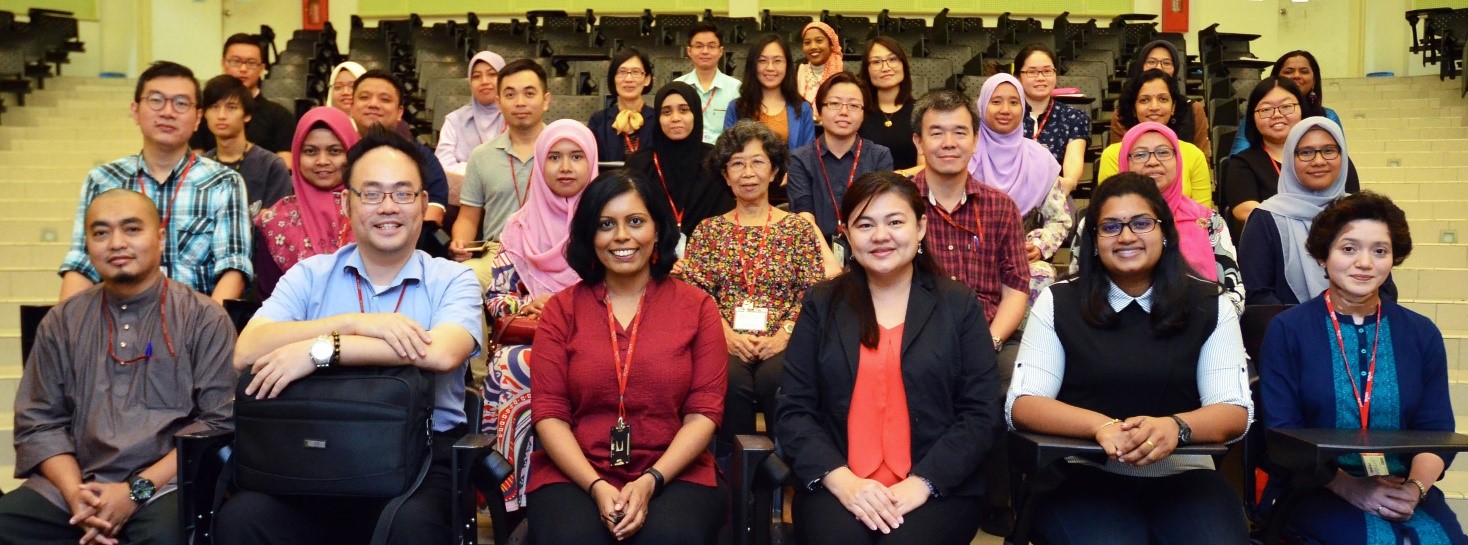
Third from left: Dr Sharon and Dr Wei posing with participants after the talk 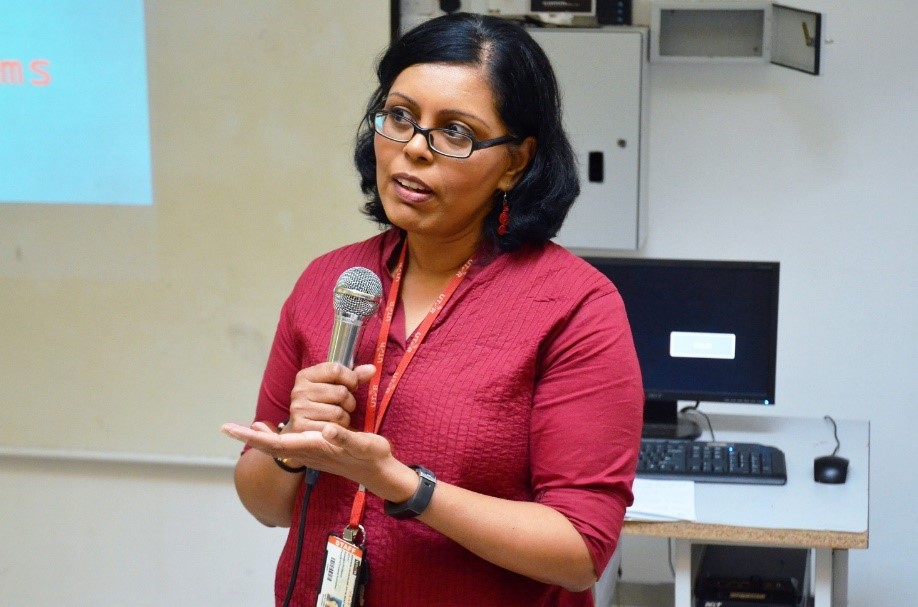
Dr Sharon listing the traits of 21st-century educator 
Participants listening attentively 
From left: Dr Wei presenting a token of appreciation to Dr Sharony |
| 4 | Centre for Learning and Teaching (CLT) received four delegates from Dezhou University at Kampar Campus on 28 March 2019
UTAR Centre for Learning and Teaching (CLT) received four delegates from Dezhou University at Kampar Campus on 28 March 2019. Present for the UTAR-Dezhou University Collaborative Symposium, the Dezhou delegates included Human Resource Department Director Prof Zheng Xiaoyan (郑晓燕), English College Department Dean Prof Ma Yingxin (马应心) and lecturers Dr Li Long (李龙) and Dr Xu Tianhua (徐田华). They were cordially received by CLT Chairperson Dr Wei Chooi Yi, Faculty of Arts and Social Science (FAS) Dean Dr Lee Lai Meng, Division of Community and International Networking (DCInterNet) Deputy Director Dr Chen I-Chi and Institute of Postgraduate Studies and Research Deputy Director for Kampar Campus Dr Chong Yee Lee. Also present for the symposium were FAS Acting Deputy Dean for R&D and Postgraduate Programmes-cum-Head of Programme for PhD (Social Science) Dr Gerard Sagaya Raj a/l A Rajoo as well as FAS Department of Languages and Linguistics (DLL) lecturers Bharathi a/p Mutty and Kristina a/p Francis. Welcoming the delegates to UTAR Kampar Campus and also to FAS, Dr Lee also gave a brief introduction on the faculty’s history, organisation structure, staff expertise and available undergraduate as well as postgraduate programmes. Both Dr Lee and Prof Ma also expressed their fervent hopes to see collaborations between FAS and Dezhou University involving academics and students being carried out in the near future. Kickstarting the exchange in teaching and learning in English was Dr Gerard who presented his finding titled “Reading strategies and gender differences: Is there a difference?” which investigated the reading strategy use of English as a Second Language (ESL) students in a Chinese independent school as well as the differences in reading strategy use according to gender. “The results showed that there is a difference in reading strategy use by the Chinese ESL readers and the use of reading strategy is also determined by the proficiency level,” explained Dr Gerard. He also added that based on his findings, good readers employed more reading strategies than the average readers in order to comprehend the texts. In addition to that, gender was not a significant determiner in the use of reading strategy, which include skimming, scanning, inferencing, rereading, first-to-second-language transfer and monitoring comprehension. This was followed by Bharathi’s presentation titled “Flipping the classroom to teach grammar to undergraduates” in which she explained the meaning of the flipped classroom and the purpose of her research. Using UTAR’s very own web-based learning environment (WBLE2) as a subject, the research’s objectives are to discover the effectiveness of WBLE2 and the perceptions of students and academics using it, but with the focus on grammar teaching and learning. “Our preliminary findings show that after the experimental week, there are improvements reflected in the quizzes. As for the perceptions, the lecturers find that students are more independent because they had to answer the questions on their own. The students also become less passive and more critical in their thinking. As for the students, they felt that the lessons are more interesting and have more time to digest the lessons. It also boosts their independence in learning,” the English lecturer continued. Kristina’s “Design and development of a flipped professional development massive open online course (FiT-PD MOOC) for university educators” shed light on teachers’ professional development, its various challenges and also importance. “Most traditional professional development are ineffective because they lack content focus, active learning, coherence, duration and cooperation. Therefore, this research focuses on flipped professional development concentrating more on teachers, but in the form of MOOC,” mentioned Kristina. She also pointed out that her research objectives are to identify the problems and needs by ESL university educators in the existing professional development programmes. Besides obtaining the validation from experts, Kristina’s research also aims to evaluate the ESL university educators’ acceptance and usability towards the FiT-PD MOOC. Thanking the trio for sharing their findings and insights, Prof Ma also took the center stage to present her study titled “College English CBI teaching and evaluation reform and practice”. Speaking on five areas, namely the educational reform background, goals, practice approach, educational practice and effect of educational reform, Prof Ma also introduced the essential role of Dezhou University in the cultivation of talents via English teaching. “In line with Dezhou University’s innovative applied talents training goal, we apply the concept of content-based instruction construction of subject knowledge and language skills. This is also done so with the combination of the English course system and scientific evaluation system to cultivate proficient language skills, high-order thinking skills ability, patriotism and also foreign language talents,” the Dean said. Besides exchanging views on effective English learning and teaching, the delegates were also impressed by UTAR’s prodigious growth as a not-for-profit private university in just a span of 17 years. To deepen their understanding on the University’s various initiatives in the areas of teaching, R&D, training, industry partnerships, community engagements and so on, they were also introduced to centre chairpersons as well as academics. They included Institute of Management and Leadership Development Director and Belt and Road Strategic Research Centre (BRSRC) Chairperson Prof Dr Cheng Ming Yu and Faculty of Science (FSc) Department of Biological Science academic Assoc Prof Dr Wong Hann Ling. Besides introducing to the delegates on UTAR’s appointment by China’s State Administration of Foreign Expert Affairs (SAFEA) as one of the recognised overseas training providers, Prof Cheng also presented the initiatives by UTAR’s BRSRC in line with China’s Belt and Road Initiative. Dr Wong also presented several success stories of FSc’s research projects in helping the industry. The visit ended with a souvenir presentation and group photograph session. An institution of higher learning with a global outlook, UTAR currently has over 330 partners from over 28 economies which have brought about mutual initiatives such as staff and students exchange, joint research and supervision, study tours, internships, cyber classrooms, industry consultation and so on and so forth. With China alone, UTAR has over 60 collaborative partners comprising universities and corporations. |
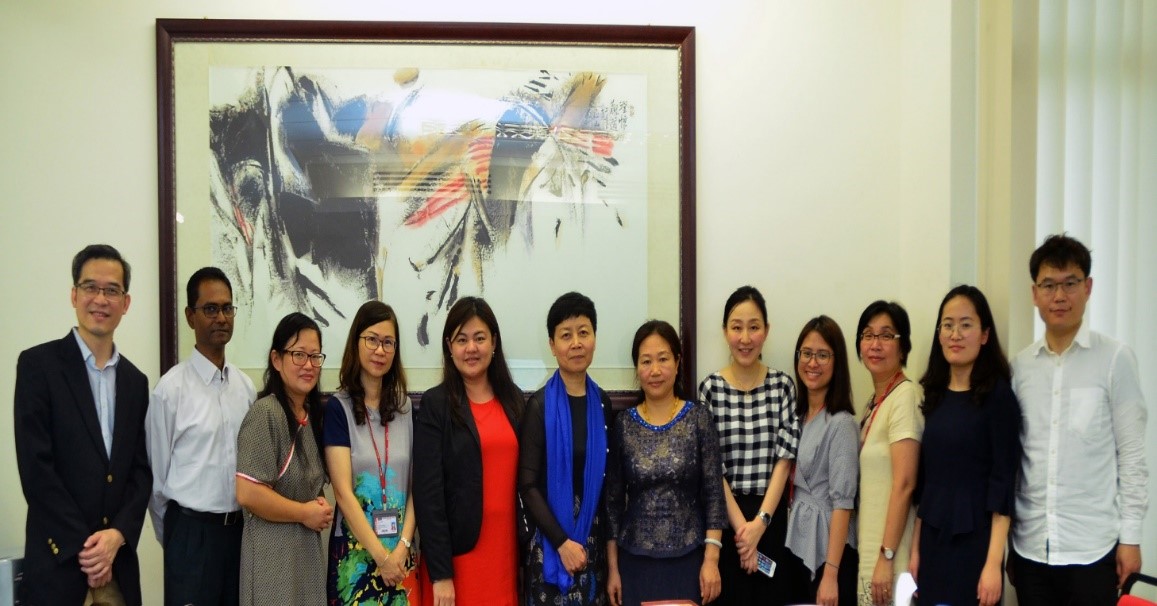
From left: Dr Wong, Dr Gerard, Dr Chong, Dr Lee, Dr Wei, Prof Zheng, Prof Ma, Dr Chen, DCInterNet assistant manager Chin Sau Lai, Division of Human Resource Kampar Campus Head H’ng May Eng, Dr Xu and Dr Li 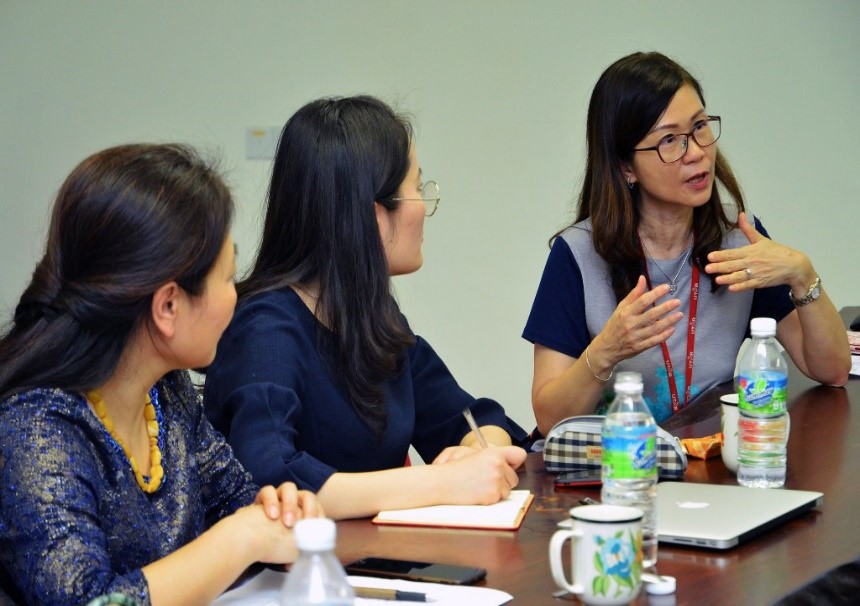
Dr Lee (right) explaining the programmes available at FAS and its various projects while Prof Ma (left) and Dr Xu look on 
From left: Dr Gerard, Bharathi and Kristina presenting their research findings 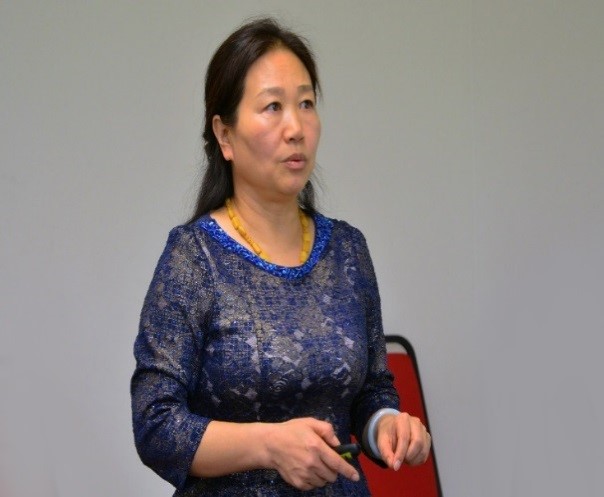
Prof Ma introducing Dezhou University’s approaches in English teaching and learning 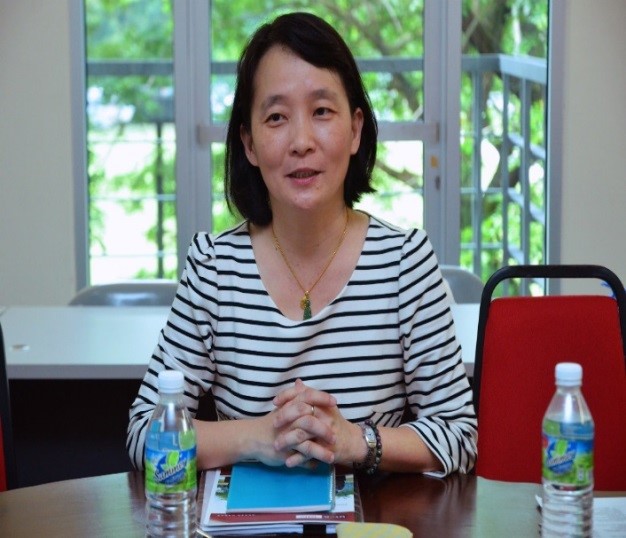
Prof Cheng explaining to the delegates IMLD’s much collaboration with China and also the research initiatives by BRSRC on the Belt and Road Initiative 
Dr Lee (left) and Prof Ma exchanging souvenirs 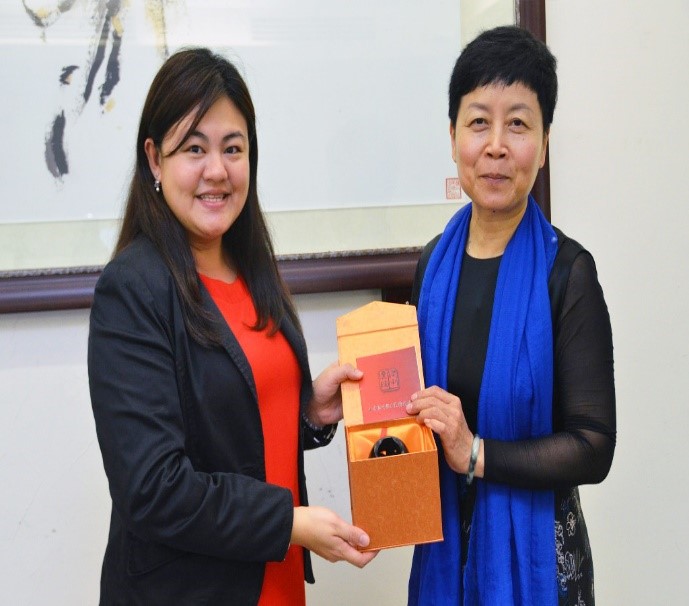
Dr Wei (left) receiving souvenir from Prof Zheng 
From left: Chin, Dr Chen, Dr Wei, Prof Zheng, Prof Ma, Dr Xu and Dr Li visiting the Confucius-Einstein bronze sculptures site 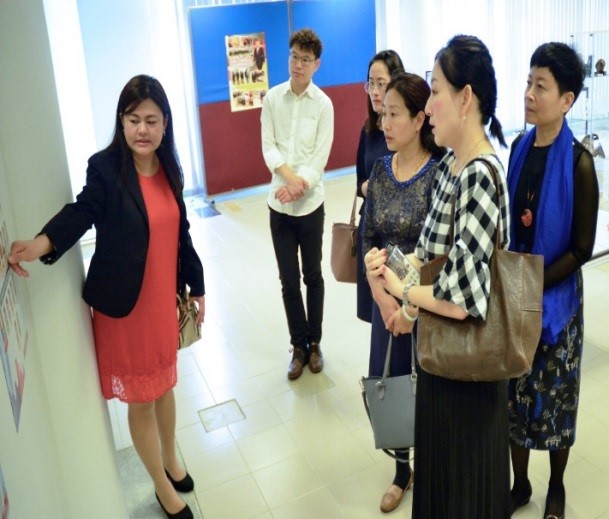
Dr Wei (most left) explaining to the delegates the University’s organisational structure 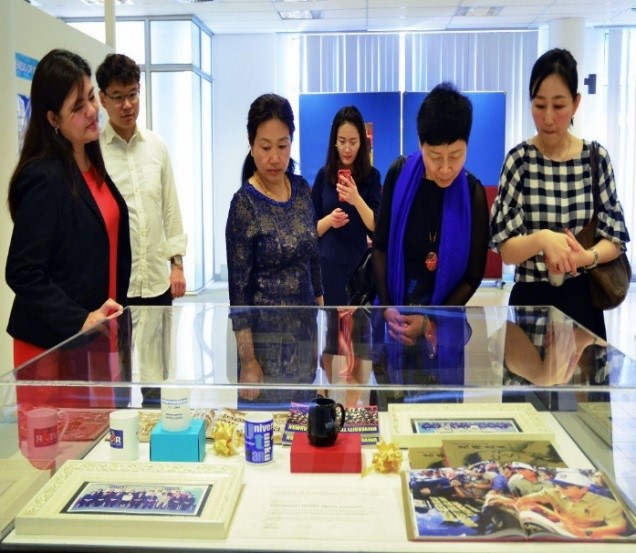
The delegates admiring the exhibits commemorating UTAR’s establishment which were displayed at the UTAR Gallery 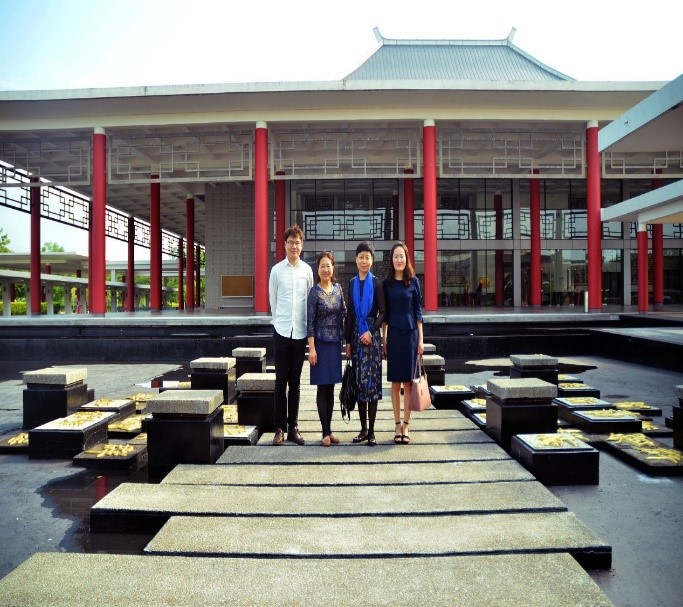
From left: Dr Li, Prof Ma, Prof Zheng and Dr Xu visiting the palatial Dewan Tun Dr Ling Liong Sik during the campus tour |
| 5 | CLT participation in the UTAR Cross-disciplinary R&D Colloquium 1.0 – Organised by the Institute of Postgraduate and Research – held on on 29 June 2019. Venue: LDK 1, 2 and 3, Block L, UTAR Kampar, Perak, Malaysia.
CLT participated in the UTAR ninth R&D Colloquium 2019 (1.0) which was organised by the Institute of Postgraduate Studies and held at Kampar Campus on 29 June 2019 focusing on the theme ‘Industry Revolution 4.0 in the Circular Economy’. Aimed at providing a platform for the researchers to update their research outcomes, research ideas, interests and project funding, the two-yearly colloquium also aimed to provide regular networking and promote cross-disciplinary research collaboration among all the researchers from 32 UTAR research centres. The colloquium also provided an encouraging stage for presenters to present early-stage research plan in order to receive some valuable feedback and suggestions from fellow professors and researchers. Organised by the Institute of Postgraduate Studies (IPSR), the colloquium was attended by UTAR Vice President for R&D and Commercialisation Prof Ts Dr Faidz bin Abd Rahman, Director of IPSR Assoc Prof Dr Yong Thian Khok, Deputy Director of IPSR Assoc Prof Ts Dr Ezra Morris Abraham Gnanamuthu and Chairperson of Centre for Communication Systems and Networks (CCSN) Prof Ts Dr Lim Eng Hock. In his speech, Prof Faidz welcomed everyone to UTAR Kampar Campus and also to the colloquium. He said, “It is very heartening to see all the researchers and participants coming together for today’s colloquium on research and development. Held for the past six consecutive years, the UTAR R&D Colloquium brought research participants together to present and share their research efforts in multiple fields of studies. I would like to thank the Organising Committee for once again organising the successful colloquium.” He added, “The one-day colloquium also aims to strengthen and nurture regular interaction between researchers from the 32 research centres in UTAR by establishing research collaboration and reinforcing cross-disciplinary research. This meeting also serves as a great platform for researchers to continuously update on research outcomes to the research centres, faculties, IPSR and the Vice President’s office for R&D and Commercialisation.” This was followed by Dr Yong who started the ball rolling by presenting “UTAR’s Five Years Research Strategic Plan – R&D Roadmap” which gave the research participants a better understanding of the current and the future view of research. Prof Lim’s presentation titled “External Funding Application in Science Aspect” enlightened the participants on how to write a good proposal in order to obtain external funding. In his talk, he explained on the research features that one should focus more in order to obtain the right and good external funding. Meanwhile, Prof Dr Eng Yoke Kee from the Faculty of Business and Finance explained to the participants on the right ways to secure the external funding for their social science research through her talk titled “External Funding Application in Social Aspect”. The colloquium then continued with four sessions held concurrently with four sub-themes, namely ‘Promoting Inclusive of Social Science and Humanity in Engineering Science for Sustainable Development and Community Well-being’, ‘Smart City’, ‘Sustainable Development in the Fourth Industrial Revolution: Shaping the Future’ and ‘New Strategies and Technologies for Healthcare Waste Management in the Circular Economy’. It was chaired by the Chairperson of Centre for Power Systems and Electricity Prof Ir Dr Lim Yun Seng, Chairperson of Centre for Vehicular Technology Dr Bernard Saw Lip Huat, Chairperson of Centre for Cyber Security Assoc Prof Ts Dr Yap Wun She and the Chairperson of CCSN Prof Lim respectively. The one-day colloquium saw a total of 20 presentations on various topics including volunteerism, social media, heritage and culture, healthcare waste, UHF RFID Tag, IoT, railway power, artificial intelligence, social-economic impact, e-commerce and fourth industrial revolution. Among the highlights were Dr Eddy Cheah Seong Guan’s presentation on “Investigation of Upper Respiratory Carriage of Pathogenic Bacteria”, Ts Dr Ooi Chek Yee’s presentation on “Device-Circuit Level Simulation Study of Three Inputs Complex Logic Gate Designed Using nano-MOSFETs”, Ts Dr Lee Wai Kong’s presentation on “Signature Gateway: High Speed Signature Generations for Industry 4.0 Communication”, Dr Peter Yacob’s presentation on “Readiness of Malaysian Manufacturing SMEs towards Industry 4.0”, Dr Nadia binti Mohamad Hatta’s presentation on “Government Policies on Management of Clinical Waste in Malaysia”, Dr M Sultana Alam’s presentation on “Factors Influencing Young Women Decision Making in Pursuing Science, Technology and Engineering (STE) Education: Gender Gap in STE Education”, Dr Chua Kein Huat’s presentation on “Railway Power Supply and Distribution for Third Rail”, Dr Tee Yee Kai’s presentation on “Smart CCTVc for Smart City”, Prof Ts Dr Lim Eng Hock’s presentation on “Introduction to UHF RFID Tag Antennas”, Ts Dr Lin Horng Sheng’s presentation on “IoT Based Pipeline Monitoring”, Dr Aloysius Yapp’s presentation on “Immersive Technology in Industry Design: Heritage and Culture Preservation” and Ts Dr Lee Wai Kong’s presentation on “Transforming Legacy Machinery toward Industry 4.0: A Case Study for Local SME”. One of the participants of the colloquium, a lecturer from the Faculty of Arts and Social Science Ong Sheau Wen enthused, “It is indeed a great platform for researchers to improve in the field of research and development. The R&D colloquium is a platform for academics of varied disciplines to share their expertise and to exchange resources for R&D projects. I would like to thank UTAR and the organising committee for being active in organising events such as symposiums, forums and colloquiums for staff and students to network with the academics and industry players.” |
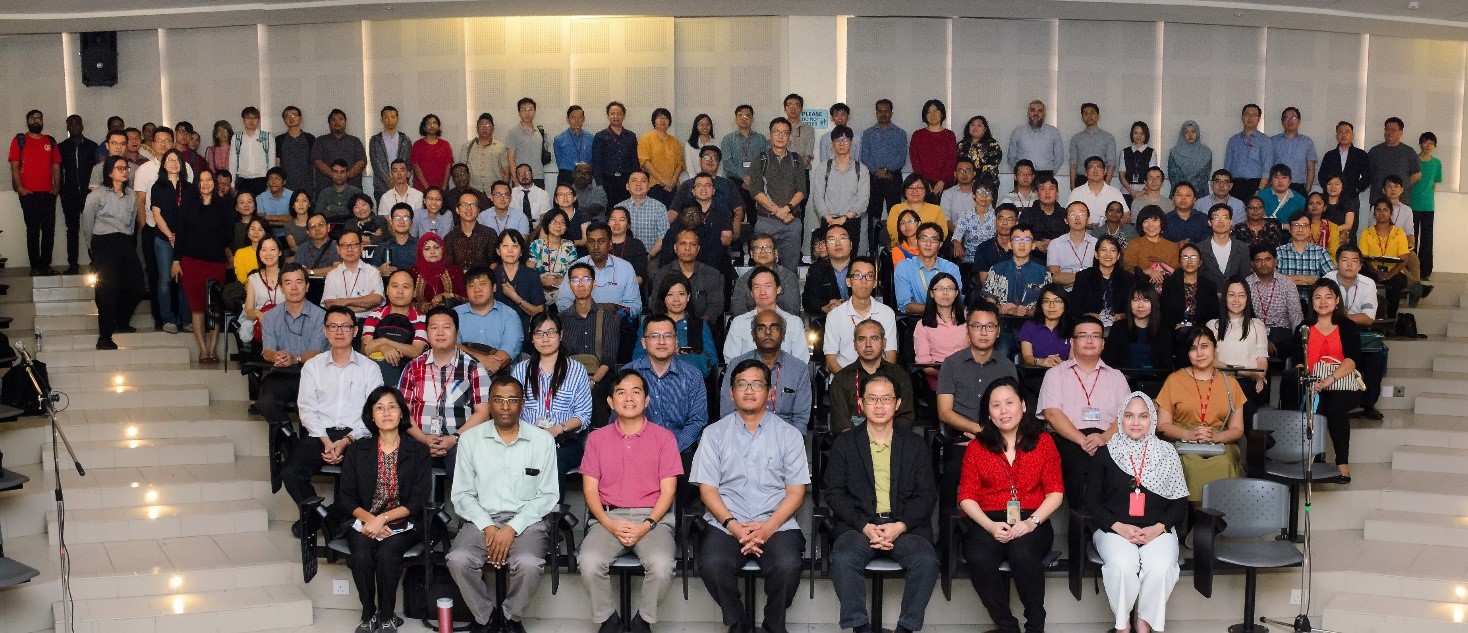
Front row, second from left: Dr Morris, Prof Lim, Prof Faidz, Dr Yong and Prof Eng with participants 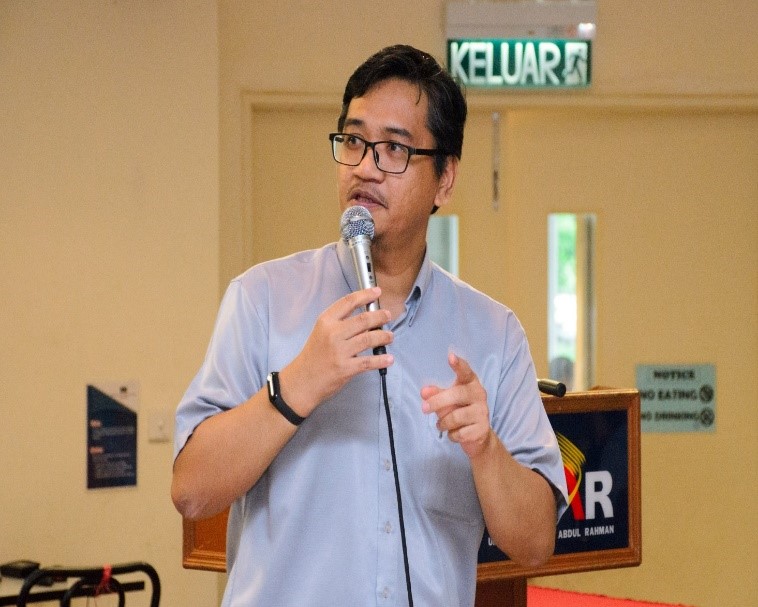
Prof Faidz emphasising the importance of cross-disciplinary research 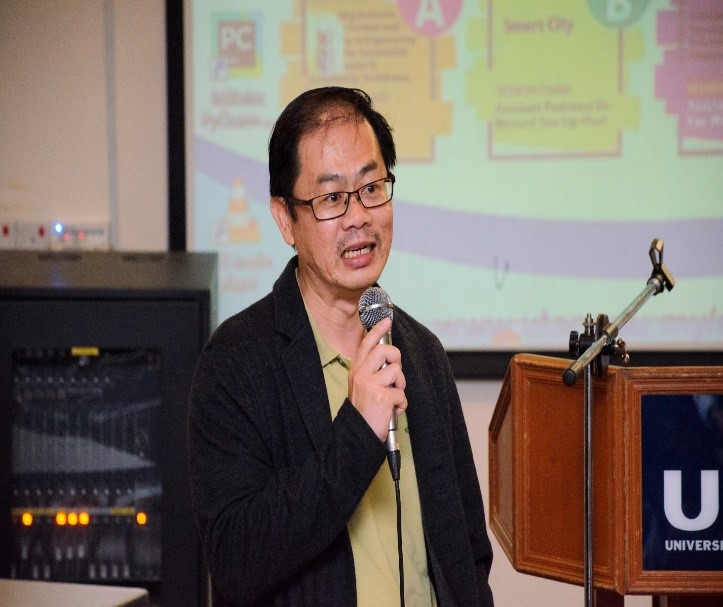
Dr Yong explaining to participants about UTAR’s five years research strategic plan 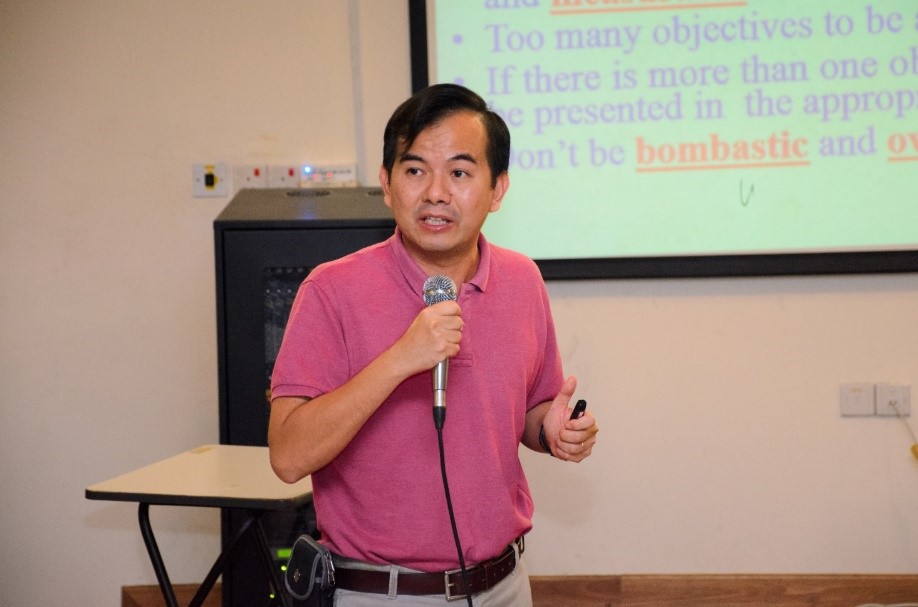
Prof Lim focusing on how to write a good proposal 
Prof Eng enlightening the participants on how to obtain a grant 
Some of the speakers (clockwise, from top left): Dr Peter, Dr Lee, Dr Sultana, Dr Nadia, Dr Aloysius and Dr Chua |
| 6 | Provide training and educational study to the Guangxi University delegates – held on 12 July – 3 Aug 2019, Venue: UTAR Sungai Long and UTAR Kampar
Delegates from Guangxi University brought home new insights in teaching as well as warm memories as they made their trip back to China on 3 August 2019. For the previous three weeks, they had spent their time in Malaysia, particularly in UTAR, to learn to integrate technologies in teaching while at the same time getting close to the people in Malaysia and learning about its culture. The training programme was customised to the needs of faculty members of the Teaching Development Centre, Guangxi University of Chinese Medicine (GXUCM). It aimed at fulfilling the training goals such as to strategically enhance participating teachers’ hands-on expertise towards the 21st-century university teaching and learning, with emphasis on English proficiency in content delivery and public speaking, the principles of student-centred learning and the use of innovative pedagogies i.e. problem-based delivery methods and application of technology. Receiving the delegates were UTAR Centre for Learning and Teaching (CLT) Chairperson Dr Wei Chooi Yi and CLT member Dr Ngeow Yeok Meng. Titled “21st Century Teaching Skills”, the training covered a wide scope of teaching skills and management, conducted by UTAR academic staff from both Sungai Long and Kampar campuses. “I would like to thank the organiser for the invitation and the hospitality provided. All of us from Guangxi University will cherish the opportunity and attend all the classes and courses with full commitment,” said School of Ruikang Clinical Medical Sciences Associate Chief Physician Zhang Wei. Among the workshops in the training include English communication skills, outcome-based education, and evaluation of teaching methods. After two weeks of intensive yet interesting classes, the delegates shared their learning outcomes. The presentation served as a platform for the participants to apply the techniques they have learnt. Set in a mock classroom environment, participants presented topics related to their expertise. They were also given feedback and comments to improve their presentations. A participant, Bu Haibo presented on “Critical Thinking in Reading Advertisements”. In his presentation, he outlined three core skills in critical thinking, namely curiosity, scepticism and humility. In turn, another participant, Lan Ying spoke about the differences between general English and English for Specific Purpose (ESP). The ESP is not fundamental to everyone but recommended to be taken for Personal development, social needs, vocational needs, as well as to improve learning styles and strategies. Participant Wang Meng took on a different field by presenting ways to manage hypoglycaemia. The presentation was held for three days to ensure all participants get the opportunity to present. Known for its melting pot of culture and food, the participants were also brought to Kuala Lumpur and Pangkor Island for sightseeing as well Study Tour to Gopeng and Kampar. “This training was challenging and has pushed me out of my comfort zone. It also helped to broaden my international horizon by learning about the colourful local culture. The whole syllabus was well-organised and outcome-oriented. I wish we had more time for class observations and field study. Dr Sharon Wilson’s session in the usage of technology in teaching, learning and research was really thought-provoking as well as helpful,” commented Bu Haibo. Participant Lan Ying said that the public speaking session helped her a lot, “I improved a lot in my English. I also managed to overcome my anxiety and stage fright through the practices. I also learnt that cultural integration is important in language learning. For a person to learn a language, he or she needs to understand the culture that comes with it.” As the delegates parted their way back, Dr Ngeow wished them best of luck, “The end of this training programme literally marks the beginning of a lifelong journey in scholarly teaching and learning, where we as academics pursue excellence not only in teaching content per se but also to become an expert in our interactive module delivery. We hope our participants would be more alert about the needs and learning styles of the 21st-century students, which is characterised by technology use and humanistic approach. As we strive to touch their hearts, enrich their minds and souls, improve and enhance their hands-on experiences, we face the future professional working community with greater pride and confidence we have in our students.” “I would like to express sincere congratulations to the delegates for completing the three weeks training in UTAR. I hope you have gained new knowledge and great experience through the educational tour to Kuala Lumpur, Gopeng, Ipoh, Penang and Pangkor Island. Do apply the knowledge and experience that you have gained in your career. Hope to see you in the near future and have a safe journey back to the homeland,” added Dr Wei. |

UTAR staff and Guangxi University delegates in Sungai Long Campus 
Exchanging gifts (from left): School of Basic Medical Sciences lecturer Liao Yanbo, Zhang Wei, Dr Ngeow and Dr Wei 
Delegates learning about Mary Kuok’s Library and checking out the study materials it offers 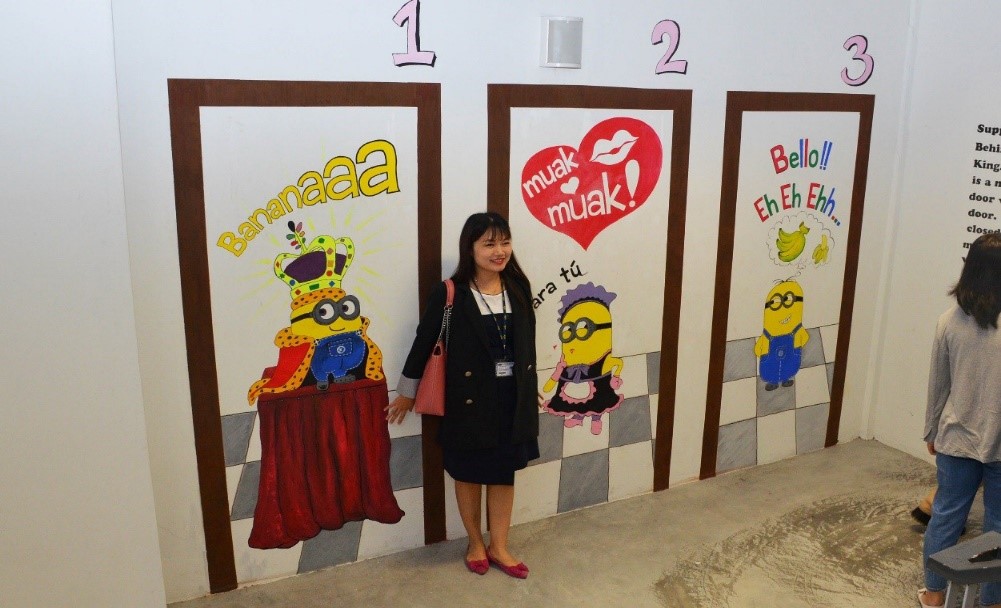
A participant posing for a photo at one of the murals drawn by students throughout UTAR Sungai Long Campus staircase 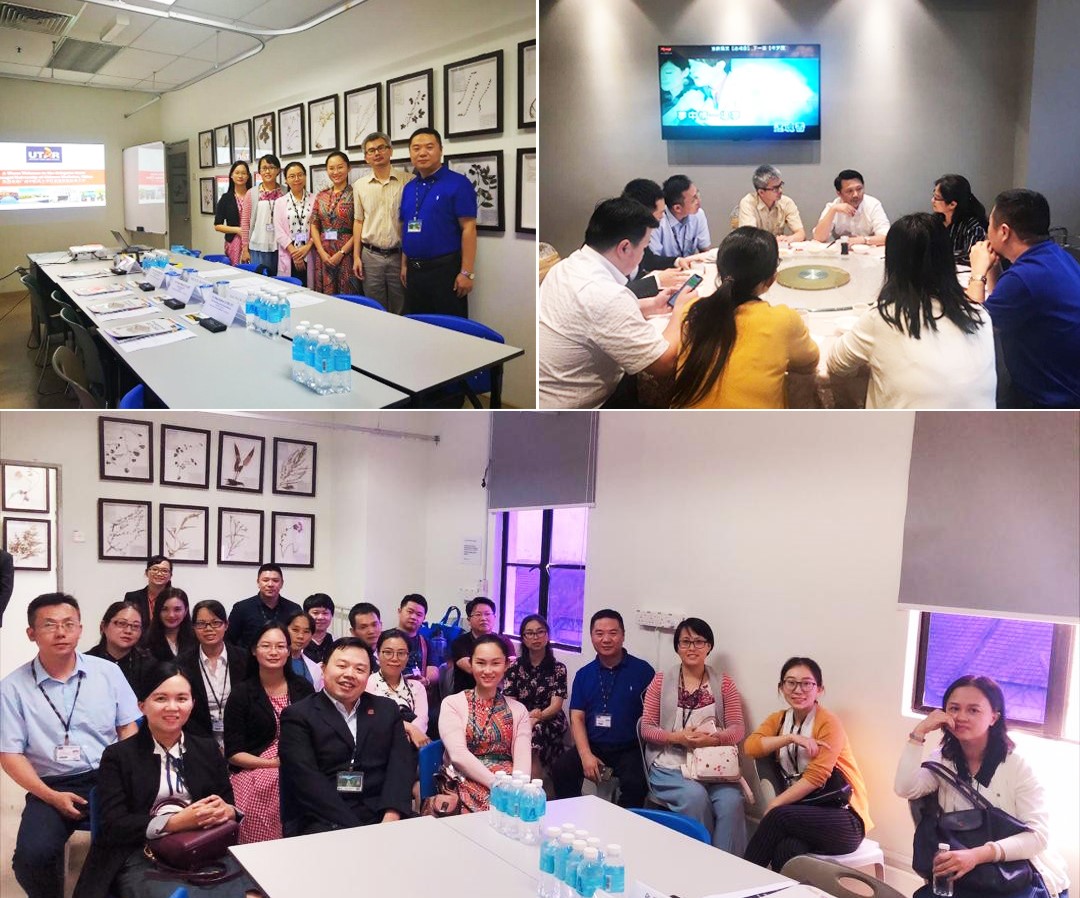
A visit to UTAR Department of Chinese Medicine at UTAR Sungai Long Campus 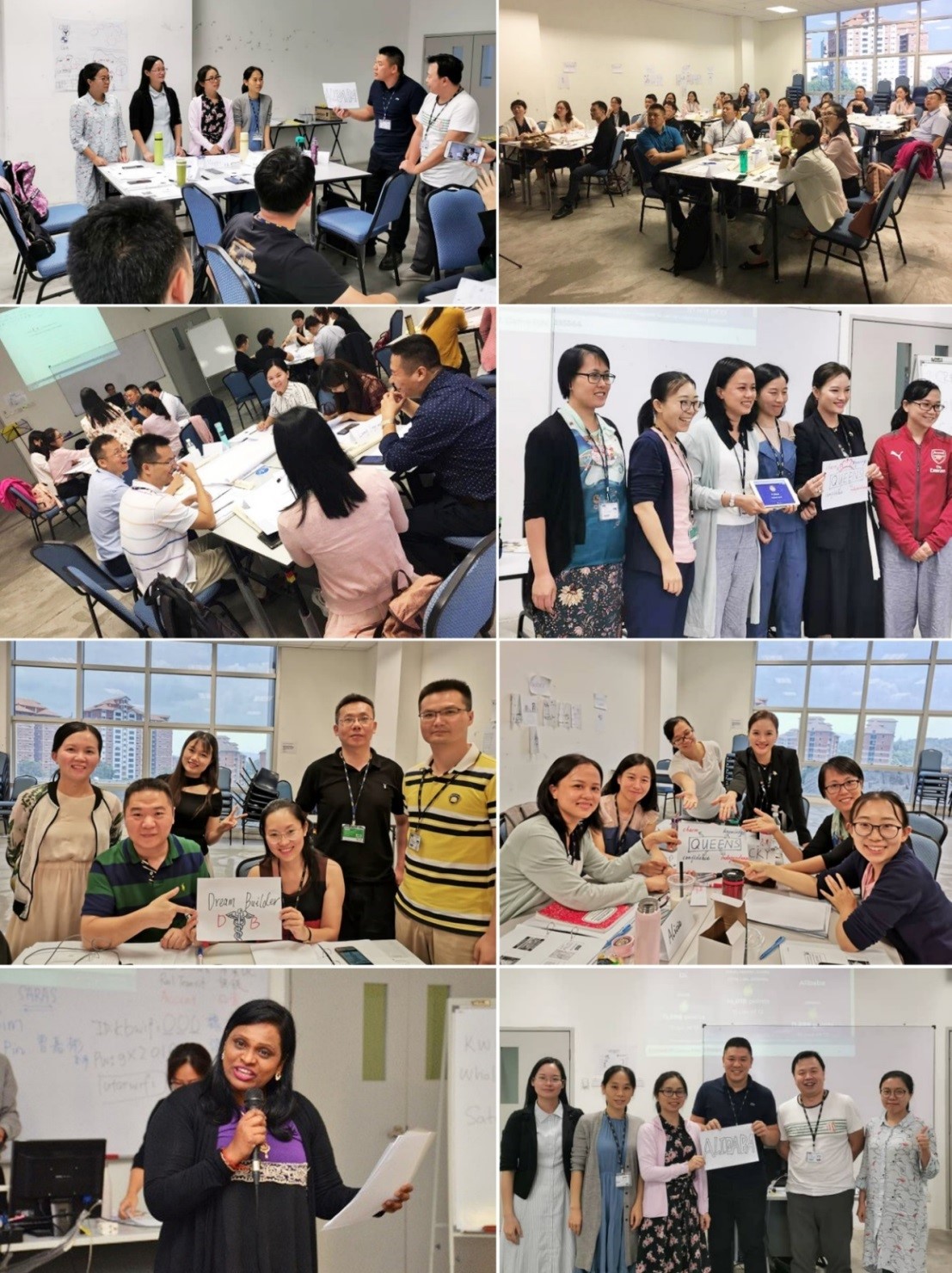
Participants attending the classes filled with hands-on and interactive activities 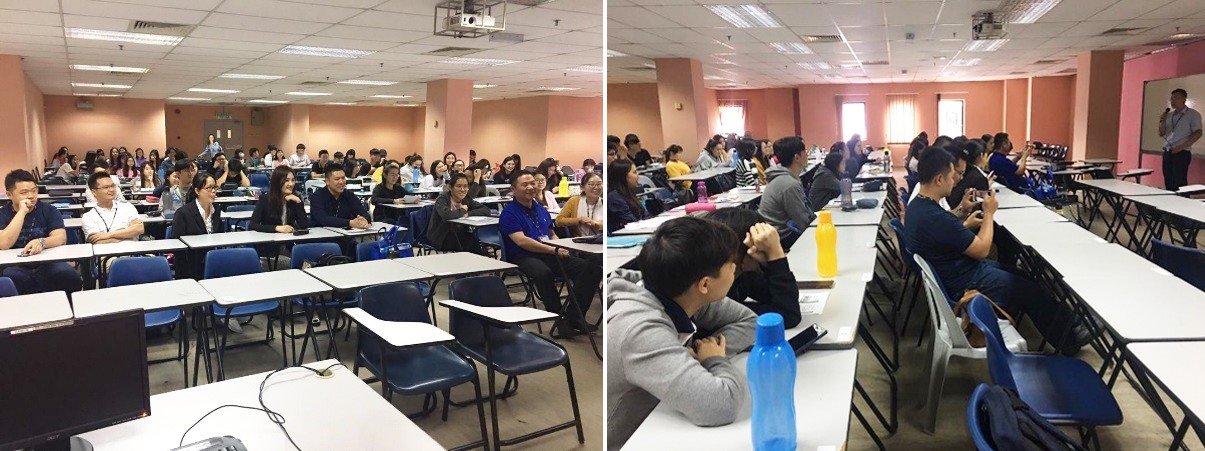
Participants interacting with Accounting students 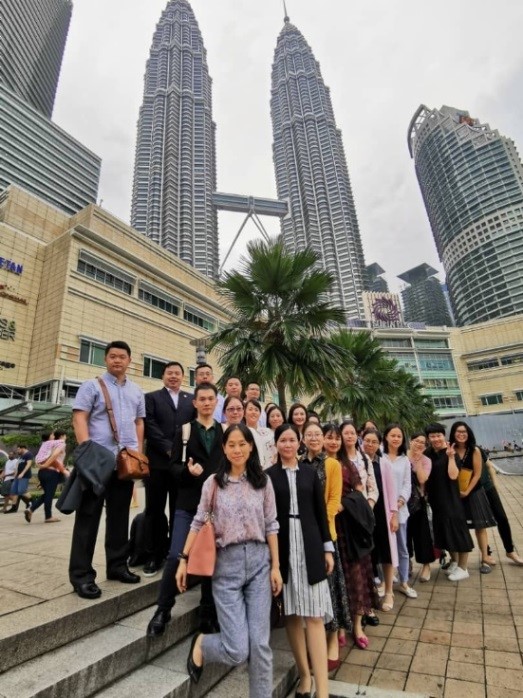
Participants having a great time in Kuala Lumpur 
Participants posing with their certificates after at the end of the training 
Participants taking the opportunity to take photos in the beautiful iconic UTAR Kampar Campus |
| 7 | The Symposium on Science Education 2019 – jointly organized by the Institute of Postgraduate Studies and Research, Centre for Learning and Teaching and Division of Programmes Promotion – held on 24 August, 2019. Venue: KB104, Block KB, UTAR Sungai Long, Selangor, Malaysia.
About 200 teachers and educators participated in the Symposium on Science Education (SoSE) 2019 organised by the Institute of Postgraduate and Research (IPSR), supported by the Division of Programme Promotion and the Centre for Learning and Teaching (CLT) on 24 August 2019 at UTAR Sungai Long Campus. Held for the sixth time, SoSE 2019 aimed to showcase innovative and effective ideas and techniques of teaching methods for STEM subjects. With its theme, ‘Sparking the Quality of STEM Education through Innovation’, the symposium took cognizance of the fact that emerging technologies are part of innovative teaching methods where it is used to facilitate the teaching and learning of STEM to engage students’ learning. Present at the event were Ministry of Education (MoE) Director of Educational Planning and Research Division Dr Ahmad Rafee bin Che Kassim, Vice President for R&D and Commercialisation Prof Ts Dr Faidz bin Abd Rahman representing UTAR President Ir Prof Academician Dato’ Dr Chuah Hean Teik, Vice President for Internationalisation and Academic Development Prof Ir Dr Ewe Hong Tat, UTAR Institute of Postgraduate Studies and Research Director Assoc Prof Dr Yong Thian Khok, staff, teachers and lecturers from various schools and universities. Prof Faidz in his welcome speech said, “SoSE is a place for educators and researchers to share innovative and effective teaching methods in STEM education; create awareness of innovative teaching methods and incorporate innovative elements in STEM teaching and learning. It also provides networking opportunities for STEM educators to share their experiences. Today’s Science Education Symposium 2019, which is part of the KLESF initiative, aimed at promoting innovative and effective learning and teaching on STEM subjects. We hope to leverage this collaboration with SoSE 2019 as a platform for educators, facilitators and teachers to share and exchange creative and innovative ideas to make science, technology, engineering and mathematics learning more effective in schools.” Dr Ahmad Rafee spoke about the importance and needs for STEM education. In his message, he said, “Stem is the future, a new economic driver, producing creators, innovators and problem solvers. Innovation-based economies require the talent of future scientists, innovators and inventors. The issues with STEM education are the decreased percentage of student enrolment, lack of awareness about STEM education among parents, pupils and teachers, lack of hands-on activity in STEM subjects, and students’ perception on STEM education.” “There is a need to change the practice of what we have so that we will have the ability to think and move forward. We need to realise that when there is a problem, blaming is not the solution. We need to seek for a solution even if we have to start at our own capacity. As long as we take the initiative to put a step ahead, we are moving forward towards building a better society,” added Dr Ahmad Rafee. Politeknik Tuanku Syed Sirajuddin lecturer Ts Dr Choong Chee Guan who is also the award winner of Malaysia Toray Science Foundation (MTSF) presented the first talk titled “Experimental of Energy Conservation Using the Concept of Magnetic and Solar Energy”. He said, “In the experimental study, the magnetic drive is used as a power transmission instead of a belt or chain driver. Theoretically, magnetic energy provides no friction when it is converted into another form of energy. DC motor generator is used to test out the efficiency of power transmission.” He added, “Some of the things we will look into the future would be to replace power transmission method chain drive to magnetic-drive to chain drive in solar panel bike and to scale up the magnetic-drive prototype by increasing the layer of the disk in order to increase the magnetic field strength.” MRSM Kubang Pasu Kedah physics teacher Muhamad Zaim Kassim who won the Excellent Teaching Award in Physics spoke about “Robotics in STEM Education: Redesigning the Learning Experience”. He said, “We include robotics class for the students to increase their interest in STEM education and at the same time to introduce programming to students to enable them to acquire skills that are relevant to the future jobs.” He continued, “Some of the robotic equipment needed are Lego, humanoid, icon base coding, C+ coding, drone, 3D printer and software. For beginners, you may choose Tinkercad. It is a free online collection of software tools that enable educators and students to create and make. We need to challenge the students to think and question critically.” Sekolah Izzuddin Shah, Ipoh teacher and MTSF Award Winner Idris bin Abdul Talib in his presentation titled, “Inovasi dalam Pengajaran dan Pembelajaran Fizik SPM” spoke about innovative teaching method and his experience as a teacher in exposing students to STEM education through hands-on activities. He mentioned, “We can increase the students’ interest towards STEM education by incorporating hands-on activities in the classroom as these approaches will teach the students the meaning behind the theory while learning the application of science in real life.” The session was followed by the last talk conducted by SMK Sultan Abdul Samad teacher Rema Regavan with the title “STEM Teaching Practices”. In her talk, she said, “Malaysian teachers need to know about the industrial revolution, 21st century learners, Malaysian Education Blueprint, Trends in International Mathematics and Science Study (TIMMS) and Programme for International Student Assessment (PISA), DSKP KSSM, STEM education, higher-order thinking skills and how to be an effective science or math teacher.” She added, “The 4 C’s in 21st-century learners are Critical thinking, Creativity, Collaboration and Communication. We need to train the students to find solutions to problems, to think outside the box, to work with others and to convey the ideas in their mind.” Malacca Matriculation College Mohd Izzat Iqbal bin Mohd Zahar said, “I may have the foundation and basic knowledge about robotics but with the opinions from other participants, I will be able to acquire more knowledge. I will definitely join the upcoming symposium as it exposes me to more knowledge and helps me to network with other educators of different expertise.” “SoSE helps me in terms of my professional development as it motivates me to continue teaching physics. I hope in the future SoSE would be more related to Industrial Revolution (IR) 4.0 and how teachers can integrate it with the syllabus so that students can engage with the environment and the industries,” said A. Thilagavathi from SMK (P) Taman Petaling. Norlizawaty binti Baharin from Sekolah Sultan Alam Shah Putrajaya commented, “As a teacher, there is a need to improve my knowledge and skills along with the changes of time. We noticed that there is a decrease in student enrolment for STEM education, thus teachers are advised to take the initiatives to conduct various hands-on activities as well as giving students the exposures they need to increase their interest in STEM education.” |
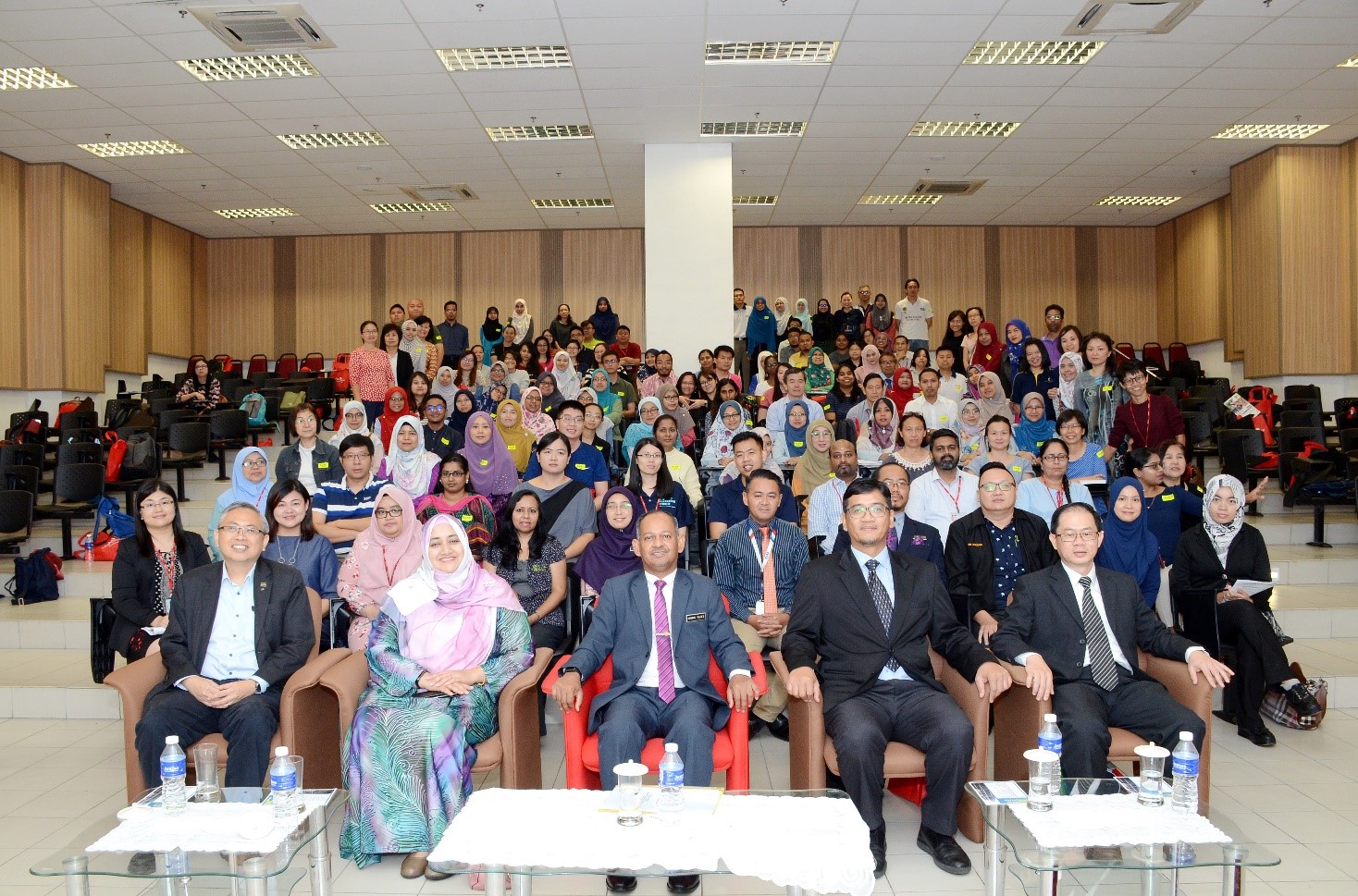
Front row, from left: Prof Ewe, TS Farah, Dr Ahmad Rafee, Prof Faidz and Dr Yong with the participants 
Prof Faidz speaking about the importance of STEM education 
Dr Ahmad Rafee advocating the importance of hands-on activities to educators 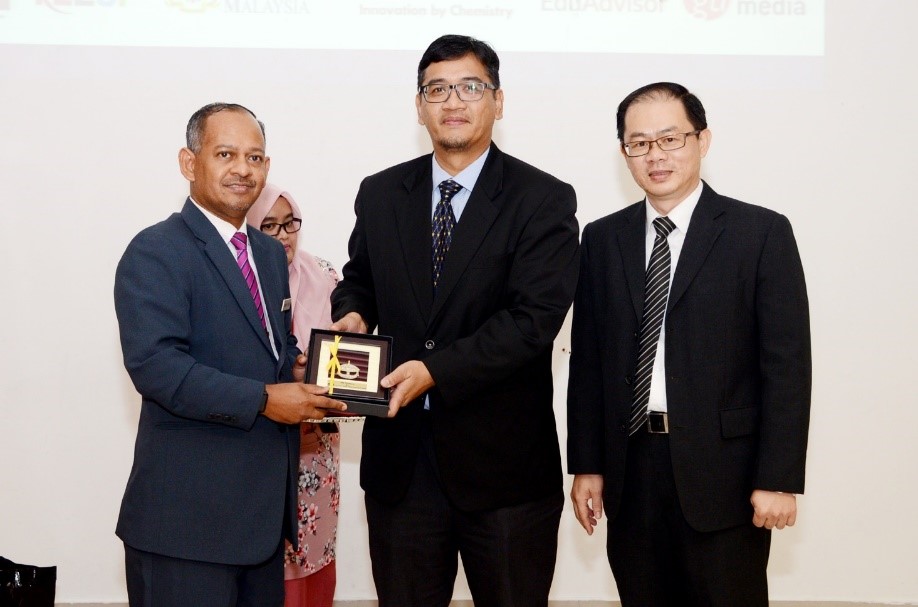
Prof Faidz (middle) presenting the token of appreciation to Dr Ahmad Rafee as Dr Yong (right) looks on 
Dr Choong (left) and Muhamad Zaim Kassim (right) delivering their talk 
Idris bin Abdul Talib (left) and Rema Regavan (right) encouraging participants to do interesting STEM-related activities in the classroom 
The symposium also featured parallel workshop session on “21st Century Technology in Teaching and Learning of Sciences” by Universiti Pendidikan Sultan Idris Prof Dr Rosly Jaafar and “Robotics Operating System - Introduction of ROS for use in Robotics” by UTAR lecturer Ir Danny Ng Wee Kiat 
Participants having a great time in Kuala Lumpur 
Participants posing with their certificates after at the end of the training 
Participants taking the opportunity to take photos in the beautiful iconic UTAR Kampar Campus |
| 8 | CLT Research Forum on 18 Oct 2019. Venue: A011, Block A, UTAR Kampar
It was an insightful sharing and learning session for Centre for Learning and Teaching (CLT) members and participants of the “CLT Research Forum: Designing 21st Century Education”, organised by CLT on 18 October 2019 at UTAR Kampar Campus. Present at the forum included Vice President of Internationalisation and Academic Development Ir Prof Dr Yow Ho Kwang representing President Ir Prof Dr Ewe Hong Tat, CLT Chairperson Dr Wei Chooi Yi, keynote speakers namely Coordinator of Curriculum Development for Science and Technology Programmes Ts Dr Chen Kah Pin and Coordinator of Curriculum Development for Non-Science and Technology Programmes Dr Ngeow Yeok Meng, as well as staff, and participants. Apart from providing opportunities for CLT members to share research ideas and learn through constructive feedback, the research forum also aimed to provide participants a platform to gain insights and discuss 21st century education. It also facilitated members and participants in building academic networks for future research collaboration. “The 21st century, which has arrived with its new trends, concepts and ways of doing things is certainly for good reasons. It is no longer about making progress by adding to the current body of knowledge. Rather, it is about transforming our understanding towards the existing body of knowledge. We shall not spoon-feed our younger generations by pouring knowledge into their brains or training them to do things. We should instead educate them on how to live in the present and progress to be a self-reliant, life-long learner. In fact, we are preparing them for jobs that have not existed,” said Dr Wei. She also urged, “The qualities of 21st Century learners should include creativity, intuitiveness, critical thinking, cooperativeness, empathy, imaginativeness, leadership and adaptability to changes. It is time for us to develop a new mindset whereby real progress is not solely judged by our university rankings and league tables but on how well-prepared our younger generations are for the future, unknown world as well. It is not about predicting what the future holds and making preparations for it, but it has also become important for us to generate a pool of talents who are engaging, passionate learners who themselves are eager in taking actions now, and then transforming our current paths for better futures.” Lastly, she advised, “We should envision an inclusive future which is for everyone with diverse socio-cultural backgrounds, belief systems, social classes, learning preferences, physical attributes and others. It is no longer the one-size-fits-all approach. Instead, we should let everyone decide when, where, what and how they want to learn with the aid of technologies. It is not about creating different tasks for different learners. It is about taping into task complexity that allows each student to learn at their own pace within an environment that is conducive for effective teacher-student feedback practices. Students should make sense of their own learning, find meaning in it and set new learning goals while teachers should explore and experiment with new teaching methods as directed by the overall goals of educational institutions.” “The title of the forum is very aptly, because it is very much related to the Fourth Industrial Revolution (4IR). Very soon, 4IR will be outdated because researchers are already working on next generation technology and findings. In today’s classroom, it is no longer about transferring knowledge in one-way communication, rather it now requires two-way communication between students and teachers. In order to prepare our students for the current workforce, they must be equipped with the 21st century skills, including the ability to learn independently outside the classroom, and to work efficiently in the age of modern technology. We have to also collaborate with people, and this is also important. The younger generation must be able to work with different people, and to be able to communicate effectively as a team player, as well as to be able to contribute to the community through group projects. In order for humans to progress with the global change brought by technology, such as artificial intelligence and automation, we should prepare our students with the necessary skills to cope with the challenges in their workplace. If we continue to be ignorant of the importance of 21st century skills, we are actually jeopardising our students’ future. We ourselves must also be prepared. For the society to function properly, it will also require members to have the capabilities to see concept in new and different lights,” said Prof Yow in his speech. He added, “Technology is conquering our world whether we like it or not. So it is our responsibility as educators to create a classroom that is conducive for students’ learning. We should no longer be enslaved by the syllabus, instead we should make way for a learning environment where students can make sense of new knowledge and information, and put what they have learnt to good use. Our ultimate aim is also to train students to acquire creativity, critical thinking, leadership, and adaptability skills to changes. Changes are constant and are happening very fast. As we make 21st century classroom accessible to everyone, we must be courageous in trying out new ideas of teaching.” First keynote speaker Dr Chen emphasised the need for change in schools’ classroom environment. He pointed out some examples of local schools where children are seated in circles to encourage team discussion. On “Imagineering” the education system, Dr Chen defined this process as “imagining what learning would look like and how engineers will make it happen.” “Higher education needs to undergo change. With the advent of globalisation and global economic crisis, employers want industry-ready graduates. Today, industries hire graduates with competency and skills, rather than graduates with a degree, even if they are from elite universities. The trend now is to accept non-degree credentials and provide certificates that show their learning abilities. With the advent of GIG economy, employers can obtain a cheaper but more effective workforce to perform the task required based on their competency and skills. Today, competency and skills matter more. The degree as we know is slowly, but surely, losing its value,” explained Dr Chen. He further elucidated that new marketplace for higher education now looks into recruiting non-traditional students. “These type of students are members of the workforce of the government industry, and are actually lifelong learners. They have varying levels of education and experience. Some of these students also lack the privilege to study at the university, what more to wait four years for their degree. Instead, they take up part-time jobs or full-time jobs to acquire additional skills and knowledge. While they juggle between their family and studies, they also make time for themselves to learn at their own time and pace, which makes their learning experience more personalised.” The participants also learnt the three categories of learning, which were Heutogogy, Paragogy (Peerogogy), and Cybergogy. He explained that heutogogy is a process of self-determined learning which give focus on the why. This method urges learners to act, think, and communicate from the inside out. Meanwhile, paragogy also known peeragogy, involved peer learning. He described it as an educational practice whereby students interact with other students to attain educational goals. On cybergogy, Dr Chen explained that the learning process involved the use of technology and the internet, which offers immersive learning. Some of the tools used under cybergogy were such as virtual reality, 3d printing, and virtual microbes. Keynote speaker Dr Ngeow shared on “Rethinking 21st Century Higher Education: A Scholarly Reflection”. She touched on aspects relating to IR4.0, individuality and personalising learning, spectrum of learners’ diversity, scholarship of teaching and learning (SoTL), and lastly on her personal PhD journey. She explained that an enthusiastic learner often possesses qualities, such as critical, creative, collaborative, comprehensive, independent, integrated, and reflective. She further explained that higher education provides learners the ability to know (cognitive), to act (psychomotor) and to value (affective). When comparing between the standardised and flexible 21st century curriculum, she explained, “An independent learner appreciates personalised education. They are autonomous, whereby they decide on what and how they want to learn. They are also effective time managers because they learn at their own pace; one episode at a time. They also give themselves space and decide what to learn best. They also decide on how much they want to or can learn. In the content aspect, this independent learning will decide which information is more relevant and the learner is free to use any technological learning tools to learn.” She went on to describe the characteristics of a PhD learner, which were analytical, resilient, realistic, self-taught, independent, confident, argumentative, having multiple perspectives, and courageous. She later shared her personal PhD journey and how she overcame the challenges faced when pursuing her PhD. She highlighted that her family’s support and good time management were important factors for overcoming those challenges. At the forum session, the panellists discussed on “Strategies to Cope with Challenges Faced by Postgraduate Students”. The moderator Faculty of Arts and Social Science (FAS) lecturer Dr Cheah Phaik Kin, introduced the panellists, which consisted of FAS Deputy Dean for Academic Development and Undergraduate Programmes Dr Khor Kheng Kia, FAS lecturer Dr Badariah binti Sani, Faculty of Engineering and Green Technology lecturer Assoc Prof Dr Sumathi Sethupathi, and Faculty of Information and Communication Technology lecturer Ts Anbuselvan Sangodiah. Dr Cheah kick-started the forum by asking the panellists to share the types of challenges faced and ways to overcome those challenges. Dr Sumathi explained that she has always loved researching and it has been a passion since. She noted that passion in doing something is very important to get it completed, regardless of the challenges faced. She mentioned that with passion, one can remain motivated in spite of difficult times to get the task done efficiently. She also advised participants to manage their time effectively and balance their time between family and research. Anbuselvan on the other hand, mentioned that he faced time constraint when conducting research for his PhD but he managed to overcome that challenge by maintaining self-discipline. He mentioned that his peers helped to keep him motivated. Dr Khor listed finding a good supervisor as one of his challenges. He explained that working with a good supervisor is important, and to be able to establish mutual respect, effort and good communication with one’s supervisor is vital to getting the research done. The challenge Dr Badariah faced was having too many sources to read, which led her to have difficulty in finding the right source to use. “Reading a lot is good and it is good to refer to multiple sources, yet the real importance of all these reading is to be able to understand what the article is saying. By truly understanding the reading materials, we will be able to write well,” advised Dr Badariah. On the note of researchers being independent for their research, the panellists agreed that researchers must make time to meet their supervisors, at the least about once a month. They mentioned that supervisors are meant to help the researcher and guide them in the right direction. The panellists also advised participants to form good communication (two-way) with their supervisors to ease disagreements and for the research to progress smoothly. Dr Sumathi added that researchers should ask why and understand the reason behind the suggestions made by their supervisors. She said that it is important to discuss and see if the suggestions are doable or not. However, Dr Badariah reminded participants to not go against their supervisor but rather, to discuss respectfully if they have any concerns or disagreements. On choosing research topics, Anbuselvan suggested participants to look into areas that interest them. He also advised the participants to read and research about the interested area, and discuss with their supervisor on the topics they have in mind. Dr Sumathi also advised participants and asked them to consider the reasons for their research; whether it is for personal growth or to contribute to the society with their research findings. Dr Badariah, on the other hand, suggested that participants look into the current or trending issues. The insightful forum ended with an interactive Q&A session. A sharing session among the CLT members and postgraduate students was held after the forum, which aimed to enlighten the postgraduate students on the members’ PhD experiences. The postgraduate students also obtained valuable advice and information from the members, namely FAS lecturer Dr Noor Azmira binti Mohamed, FAS PhD (Social Science) Programme Head Dr Gerard Sagaya Raj A Rajoo, and FEGT lecturer Ir Dr K. Chandrasekaran Krishnan. |
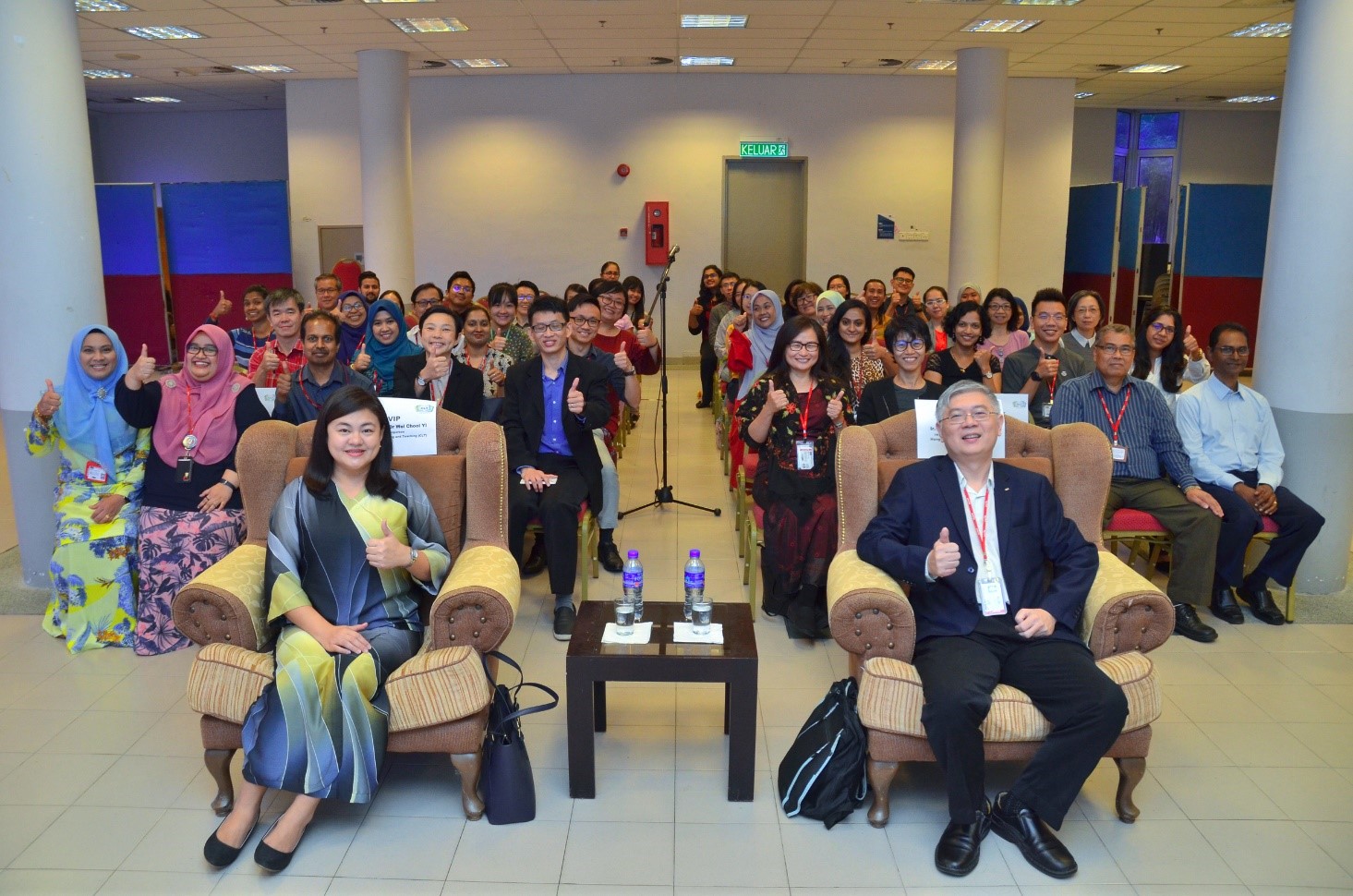
Front row from left: Dr Wei and Prof Yow posing with the participants at the forum 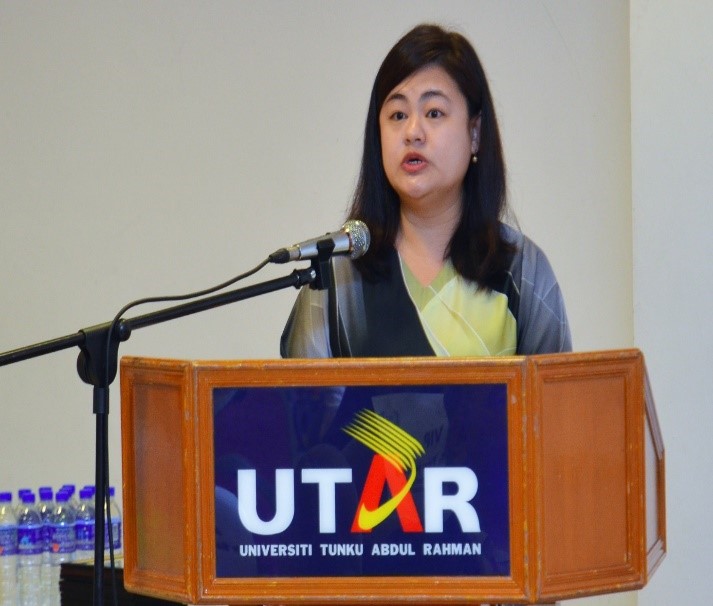
Dr Wei delivering her speech 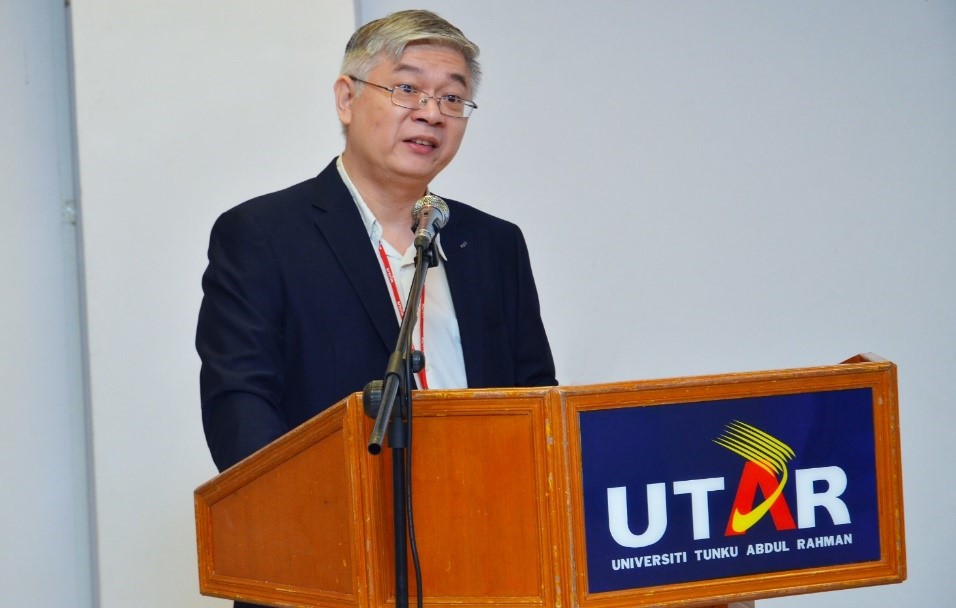
Prof Yow delivering his speech 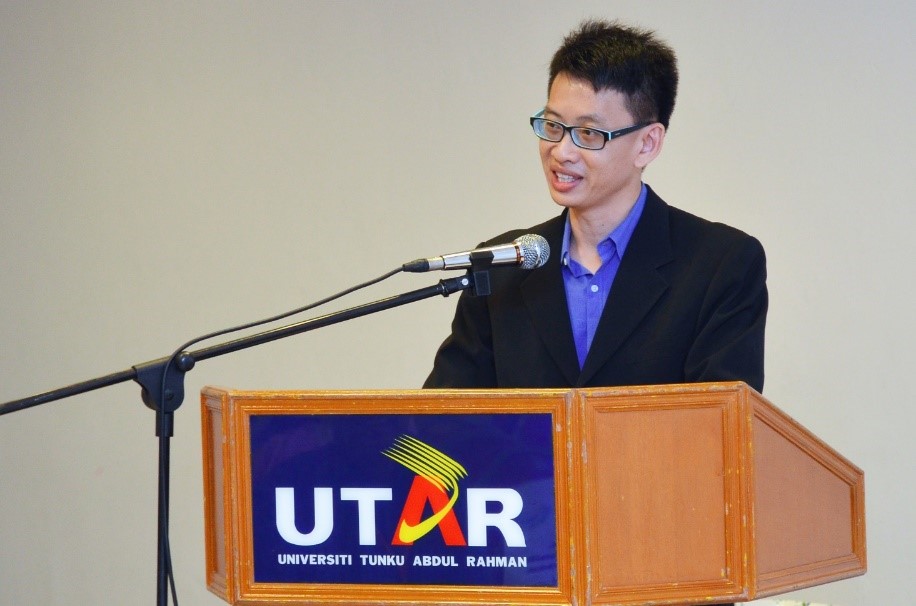
Dr Chen listing changes in the education that should be considered 
Dr Ngeow describing her PhD experience 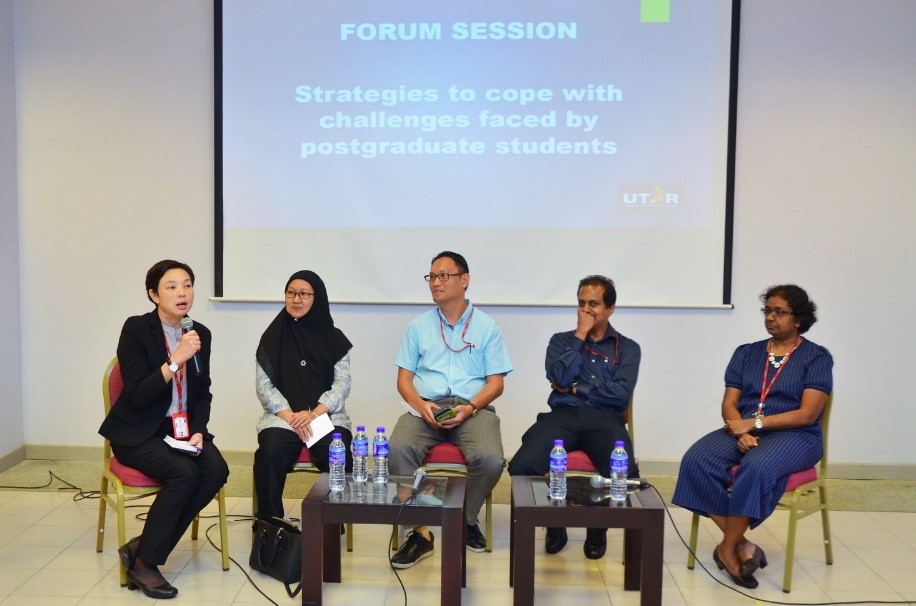
From left: Dr Cheah, Dr Badariah, Dr Khor, Anbuselvan, and Dr Sumathi 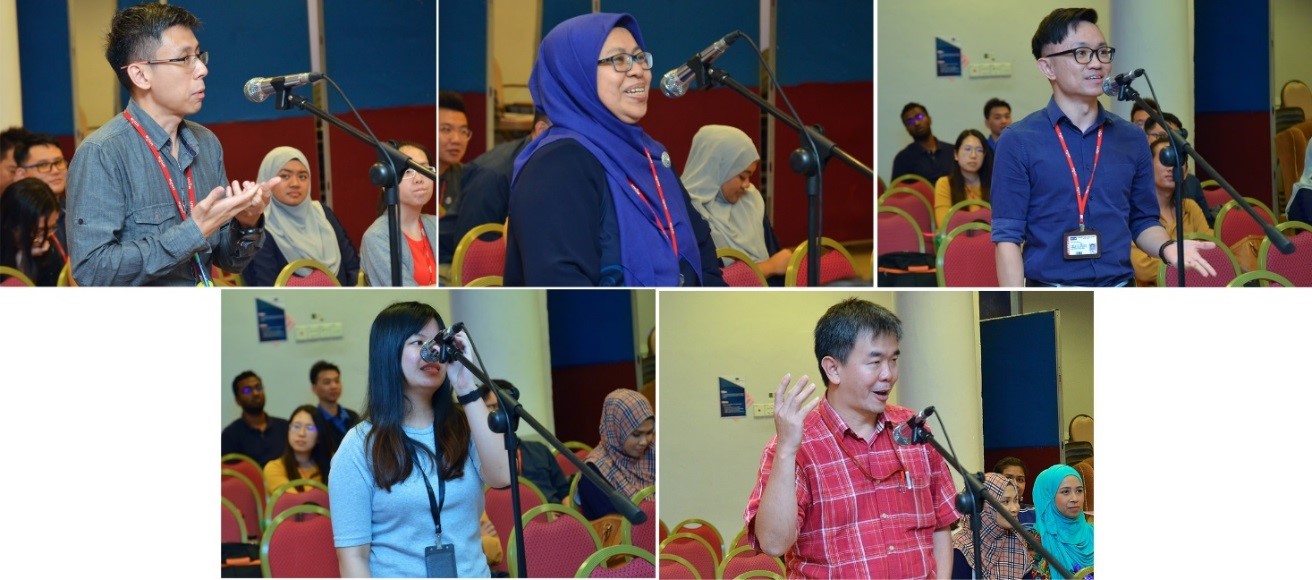
Participants at the Q&A sessiont 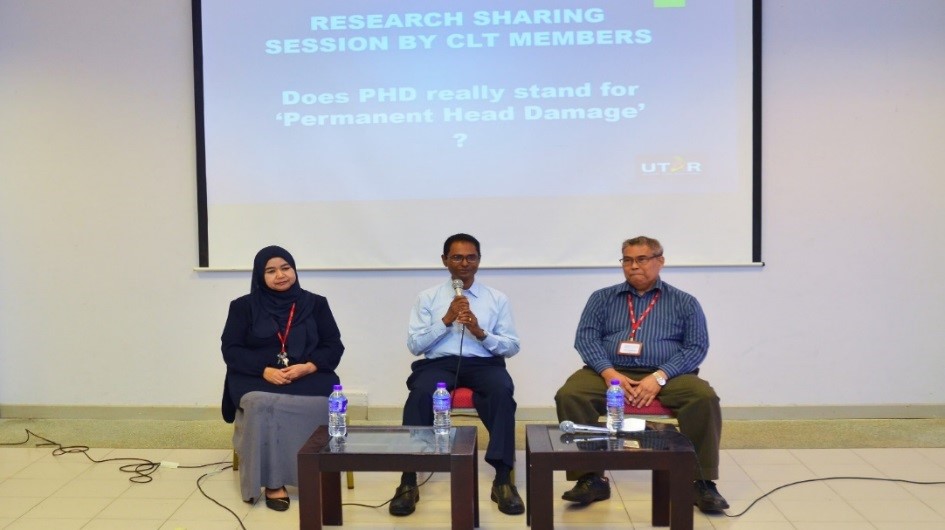
Research sharing session with (from left) Dr Noor Azmira, Dr Gerard, and Dr K.Chandrasekaran |
| 9 | Participation in the UTAR Cross-disciplinary R&D Colloquium 2.0 – Organised by the Institute of Postgraduate and Research - on 23 Nov 2019. Venue: Level 2, KB Block, UTAR Sungai Long, Malaysia.
Focusing on the theme ‘Smart and Emerging Technologies – Solutions for Sustainability (SDGs)’, the R&D Colloquium 2019 (2.0) was once again organised at UTAR Sungai Long Campus on 23 November 2019. Aimed at providing a platform for the researchers to update their research outcomes, research ideas, interests and project funding, the two-yearly colloquium also aimed to provide regular networking and promote cross-disciplinary research collaboration among all the researchers from 32 UTAR research centres. The colloquium also provided an encouraging stage for presenters to present early-stage research plan in order to receive some valuable feedback and suggestions from fellow professors and researchers. Organised by the Institute of Postgraduate Studies (IPSR), the colloquium was attended by UTAR Vice President for R&D and Commercialisation Prof Ts Dr Faidz bin Abd Rahman, staff and students. Welcoming everyone to the colloquium, Prof Faidz said, “The main purpose of this R&D Colloquium is to create a platform for the research participants to exchange ideas, interact, present and share their research efforts in multiple fields of studies.” He added, “All of us are from different expertise, so take this opportunity to talk to each other.” Prof Faidz said, “UTAR has come up with three initiatives to promote R&D. First, we are collaborating with our sister campus – Tunku Abdul Rahman University College (TARUC) to get funding. Helen Keller once said ‘Alone we can do so little, together we can do so much’. We have already started to work on selected projects and I hope that there will be more soon. Second, we are working on knowledge transfer programmes. These programmes enable researchers to share their knowledge as a way of giving back to the community. Researchers transfer their knowledge from the university to the community by organising structured programmes like talk, symposium, colloquium and etc. By measuring the return of investment (ROI), we can look at the ‘before’ and ‘after’ impact of the programme to the community. The third initiative is designed to welcome staff and students to share their ideas at the Unovate Centre.” The colloquium began with four sessions that were held concurrently. Session one themed ‘Smart technologies for a circular economy’ was chaired by Chairperson of Centre for Computing and Intelligent Systems Dr Ng Oon-Ee. It saw Chairperson of Centre for Applied Psychology Dr Gan Su Wan presenting on “The Impact of Smart Technology on Child Development: Parenting and Children’s Gadgets Use”; Lee Kong Chian Faculty of Engineering and Science (LKC FES) lecturer Dr Steven Lim presenting on “Sustainable Production of Biodiesel of Circular Economy”; Chairperson of Centre for Power Systems and Electricity Ir Prof Dr Lim Yun Seng presenting on “Energy Storage System For Ancillary Services”; Dr Ng presenting on “3D-Sensing for Agriculture” and Chairperson of Centre for Railway Infrastructure and Engineering Prof Dr Andy Chit Tan presenting on “Railway Diagnostics System”. Session two themed ‘Smart Tourism’ was chaired by Chairperson of Centre for Immersive Technology and Creativity Dr Aloysius Yapp. It saw LKC FES lecturer Dr Ooi Jong Boon presenting on “Biofuels for Transportation: Trends, Opportunities and Challenges”; LKC FES Assoc Prof Ir Dr Khoo Hooi Ling presenting on “A Bus Accident Prediction Model Using Bayesian Network; Faculty of Accountancy and Management (FAM) lecturer Dr Lee Kwee Fah; FAM lecturer Dr Komathi Munusamy presenting on “Key Factors that Encapsulate the Adoption of V-Tourism in Boosting Tourists’ Attitude Toward Malaysia”; Specialist from LKC FES Abd Muluk bin Abd Manan presenting on “Tourism Infrastructure for A Heritage Area : A Case Study of Kampung Bahru Kuala Lumpur”; Dr Aloysius Yapp and Faculty of Creative Industries (FCI) lecturer Lim Chai Kim presenting on “V- Tourism (Virtual Tourism) the Development for VGW (Virtual Guided Walkthrough)”. Chaired by Head of Computer Science Department Ts Dr Ooi Boon Yaik, session three themed ‘Innovative Technologies for Smart Society’ saw FCI lecturer Dr Sharon Jacqueline Albert Wilson presenting on “Sustainable Development in Education Incorporating Blended Learning and Digital Tools: A Case Study in Cross Border Teaching”; Faculty of Business and Finance (FBF) lecturer Yip Yen San presenting on “Influence of Managerial Coaching Towards Service-Oriented Citizenship Behaviours: The Mediating Role of Employees’ Commitment to Service Quality in Malaysia Hotel Industry”; Head of Master of Mathematics Programme Dr Denis Wong Chee Keong presenting on “The Blockchain Technology In Insurance Sector”; Faculty of Medicine and Health Sciences (FMHS) lecturer Thavamalar Paramasivam presenting on “Role of EFT In Cancer Prevention” and Dr Ooi presenting on “IoT Cloud Solution: Nexus Of Intelligent Systems”. Session four themed ‘Sustainable development through IoT and Disease Modelling’ was chaired by Chairperson of Centre for Mathematical Sciences Ts Dr Teoh Lay Eng. It saw FBF Specialist Chin Yoon Mei presenting on “The benefit of IoT technology for human beings”; LKC FES lecturer Dr Lim Ming Han presenting on “Occupational Noise Mapping Prediction Using the Stochastic Modelling”; Postgraduate student Ayinla Ally Yeketi presenting on “Ending the Great White Plague Mathematical Approach”; FMHS senior lecturer Imtiyaz Ali Mir presenting on “Efficacy of mental and physical training on blood pressure among pre-hypertensive young adult” and FMHS lecturer Gan Quan Fu presenting on “Modelling of Umbilical-Cord Mesenchymal Stem Cells as Personalize Approach to Ligament Healing”. |
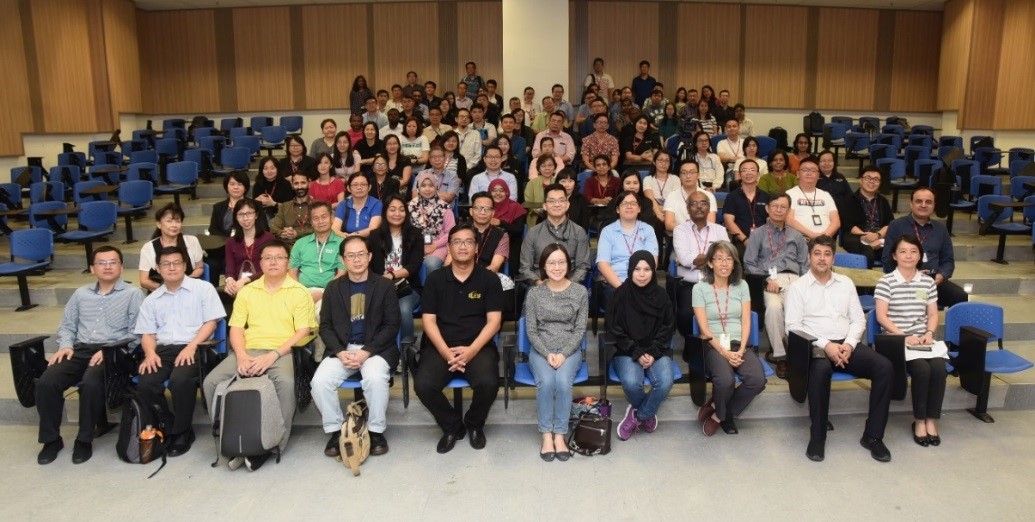
Fifth from left: Prof Faidz with researchers and participants 
Prof Faidz sharing the three initiatives prepared by the University 
Chairperson of Centre for Applied Psychology Dr Gan Su Wan presenting on “The Impact of Smart Technology on Child Development: Parenting and Children’s Gadgets Use” 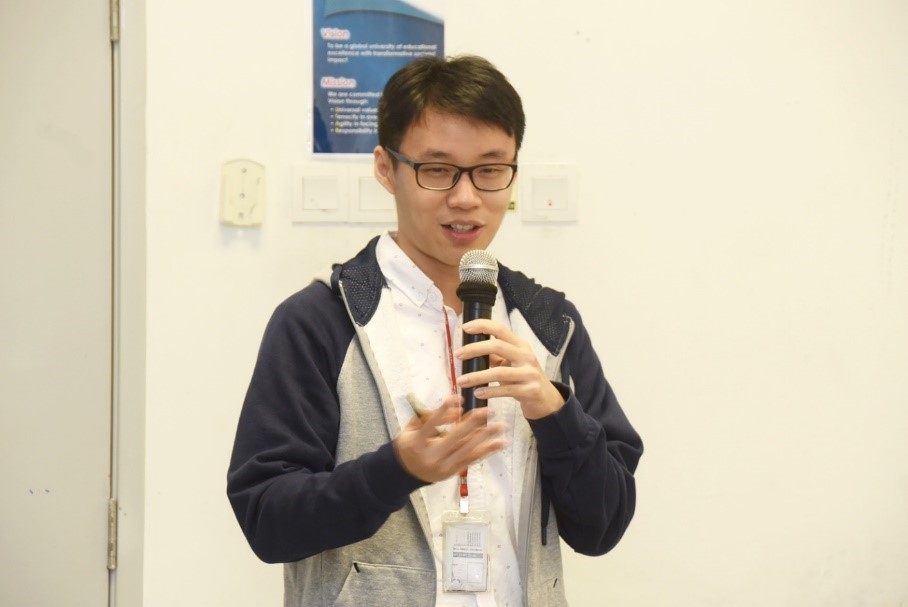
LKC FES lecturer Dr Steven Lim presenting on “Sustainable Production of Biodiesel of Circular Economy” 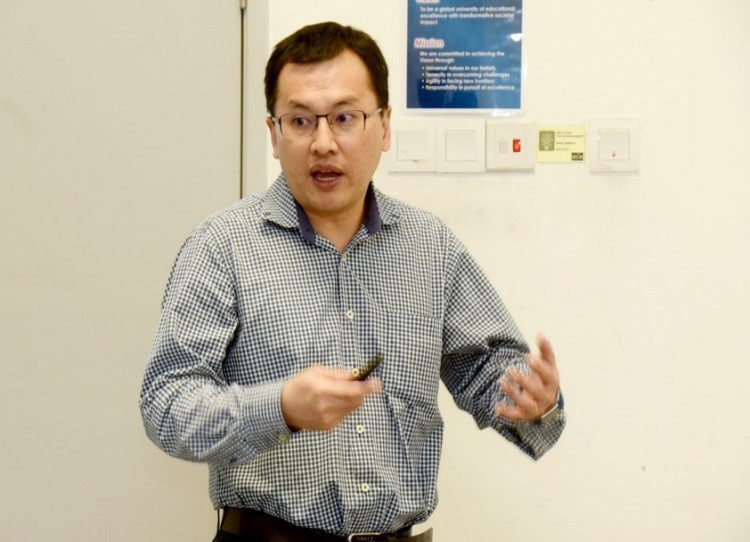
Chairperson of Centre for Power Systems and Electricity Ir Prof Dr Lim Yun Seng presenting on “Energy Storage System for Ancillary Services” 
Chairperson of Centre for Computing and Intelligent Systems Dr Ng Oon-Ee presenting on “3D-Sensing for Agriculture” 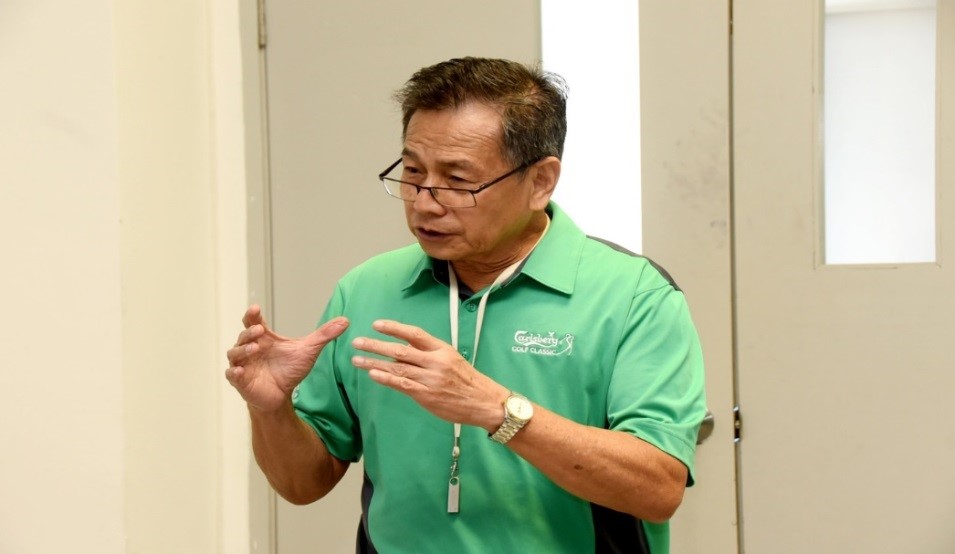
Chairperson of Centre for Railway Infrastructure and Engineering Prof Dr Andy Chit Tan presenting on “Railway Diagnostics System” 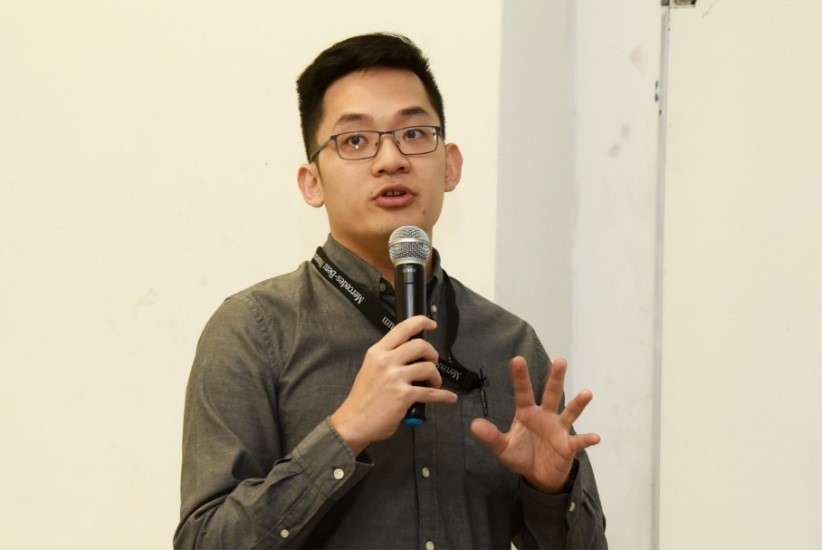
LKC FES lecturer Dr Ooi Jong Boon presenting on “Biofuels for Transportation: Trends, Opportunities and Challenges” 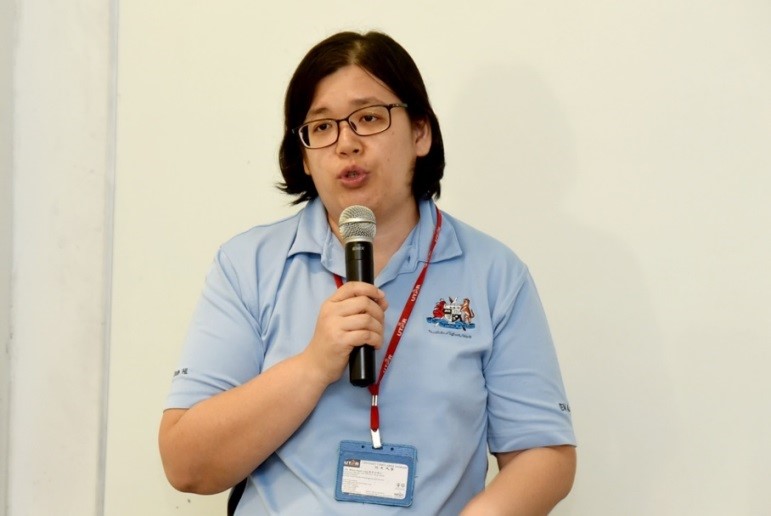
LKC FES Assoc Prof Ir Dr Khoo Hooi Ling presenting on “A Bus Accident Prediction Model Using Bayesian Network” 
FAM lecturer Dr Komathi Munusamy presenting on “Key Factors that Encapsulate the Adoption of V-Tourism in Boosting Tourists’ Attitude Toward Malaysia”/p> 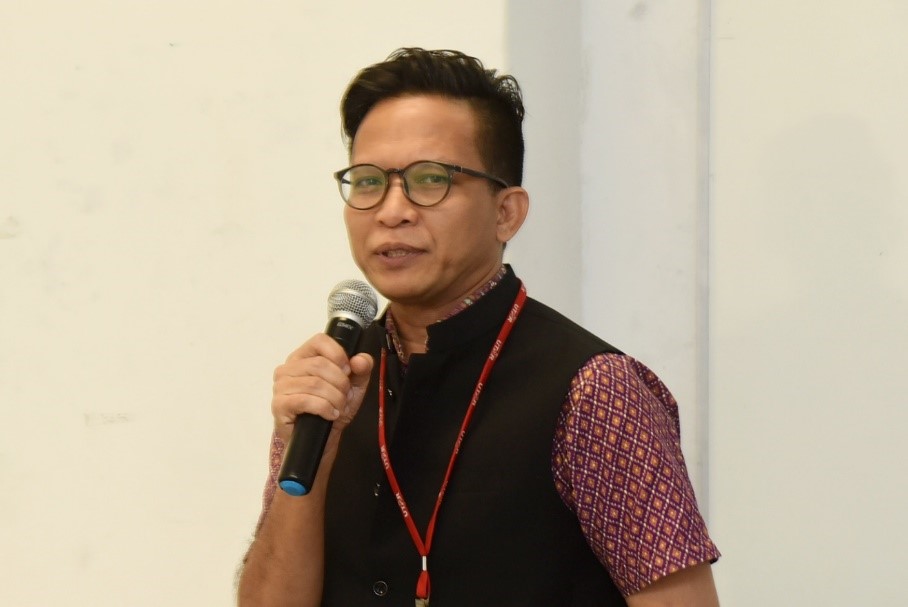
LKC FES Specialist Abd Muluk bin Abd Manan presenting on “Tourism Infrastructure for A Heritage Area: A Case Study of Kampung Bahru Kuala Lumpur” 

Chairperson of Centre for Immersive Technology and Creativity Dr Aloysius Yapp and FCI lecturer Lim Chai Kim presenting on “V- Tourism (Virtual Tourism) the Development for VGW (Virtual Guided Walkthrough)” 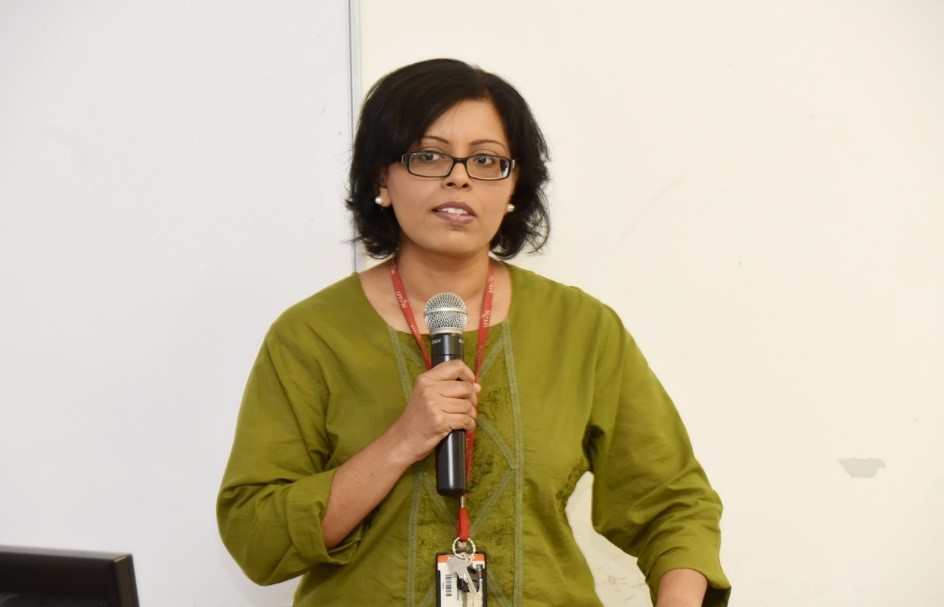
FCI lecturer Dr Sharon Jacqueline Albert Wilson presenting on “Sustainable Development in Education Incorporating Blended Learning and Digital Tools: A Case Study in Cross Border Teaching” 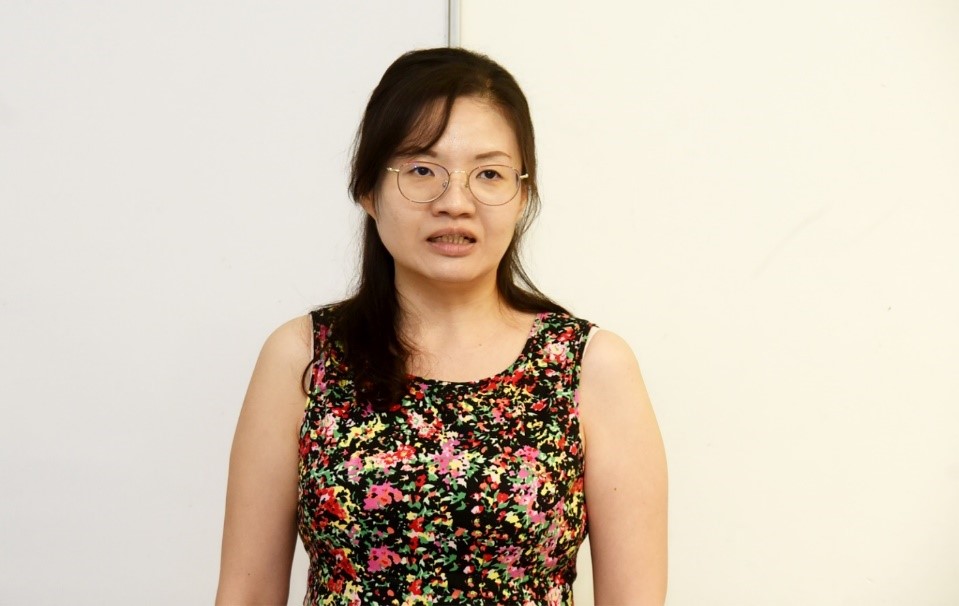
FBF Lecturer Yip Yen San presenting on “The influence of Managerial Coaching Towards Service-Oriented Citizenship Behaviours: The Mediating Role of Employees’ Commitment to Service Quality in Malaysia Hotel Industry” 
Head of Master of Mathematics Programme Dr Denis Wong Chee Keong presenting on “The Blockchain Technology in Insurance Sector” 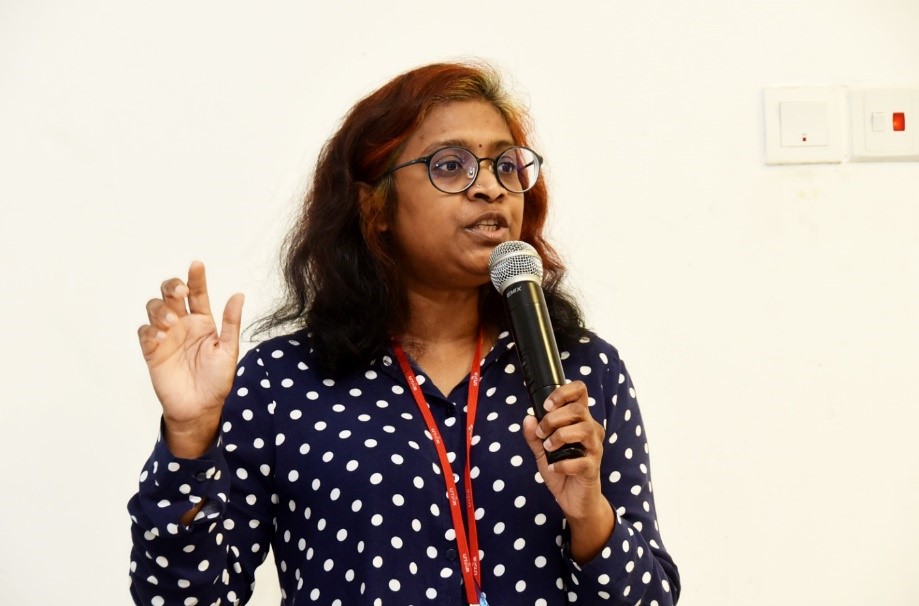
FMHS lecturer Thavamalar Paramasivam presenting on “The role of EFT In Cancer Prevention” 
Head of Computer Science Department Dr Ooi Boon Yaik presenting on “IoT Cloud Solution: Nexus of Intelligent Systems” 
FBF Specialist Chin Yoon Mei presenting on “The benefit of IoT technology for human beings” 
LKC FES lecturer Dr Lim Ming Han presenting on “Occupational Noise Mapping Prediction Using the Stochastic Modelling” 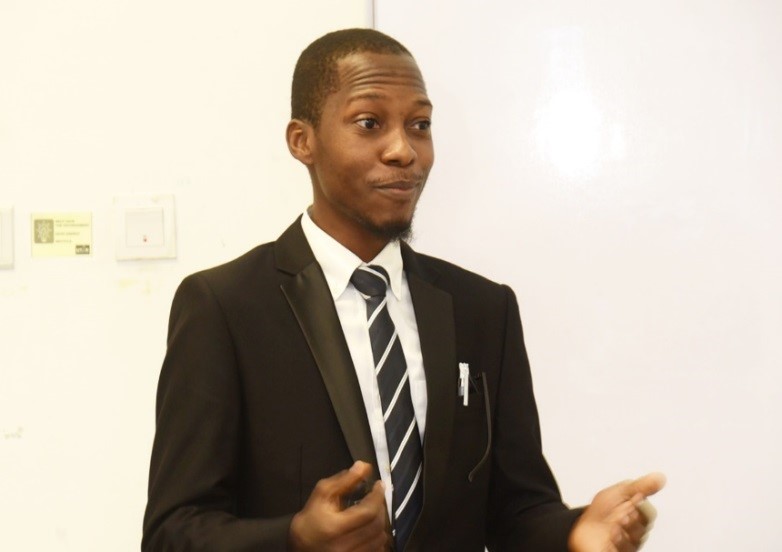
Postgraduate student Ayinla Ally Yeketi presenting on “Ending the Great White Plague Mathematical Approach” 
FMHS senior lecturer Imtiyaz Ali Mir presenting on “The efficacy of mental and physical training on blood pressure among pre-hypertensive young adult” 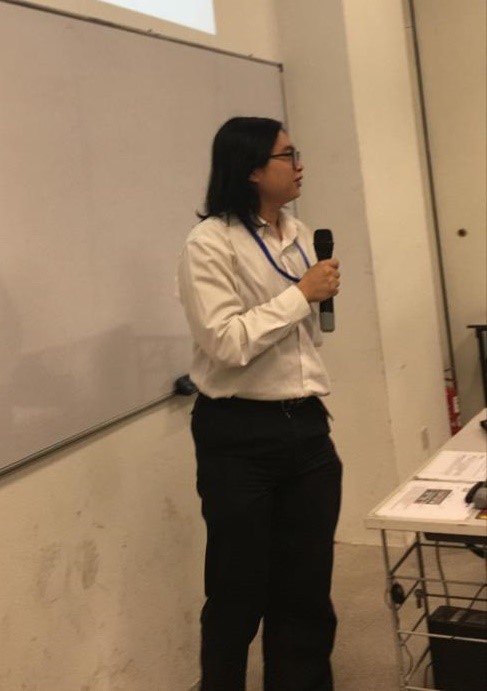
FMHS lecturer Gan Quan Fu presenting on “Modelling of Umbilical-Cord Mesenchymal Stem Cells as Personalize Approach to Ligament Healing 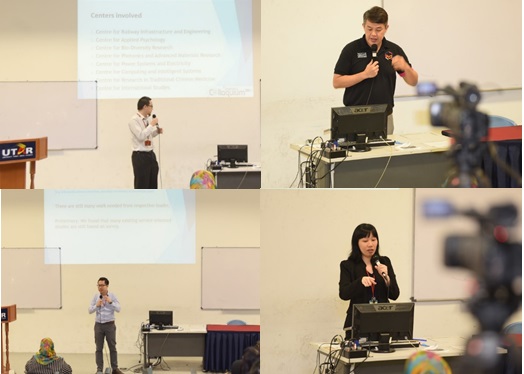
Clockwise, from top left: Dr Ng Oon-Ee, Dr Aloysius Yapp, Dr Teoh Lay Eng and Dr Ooi Boon Yaik |